#as me demanding for agency to be given to to these female characters who were done dirty
Text
In Defense of "The Acolyte"
I have been seeing a lot of criticism of the new Star Wars streaming show "The Acolyte" and some of it strikes me as unfair or nitpicking.
Details under a cut
"The fire on the hull of the ship is ridiculous, it's in outer space, with no oxygen."
The fire is not burning very high, and it clearly coming from some machinery. It's not a huge leap, it's not demanding the audience do the work of the writers, to assume that oxygen is venting out of the machinery, or else a flammable substance.
"The two twin sisters who have not seen each other in years, have an identical hairdo."
First of all, it is well documented that identical twins, even ones long separated, often make very similar, if not the same, appearance choices, life decisions and so forth. There have been cases with men who lived on opposites coast, who have married very similar-looking women with the same name, of the same age. Furthermore, they are said to have lived in a village before their estrangement, so it could easily have been a customary hairstyle of their community.
"The shadowy mentor figure of May, who speaks in an electronic and clearly male* voice, says that you can't kill a Jedi with steel or laser weapons, and yet, May did just that in the intro."
The person May killed was clearly not a Jedi, but a Matrix avatar given her pathetic Force powers and reliance on martial arts Not-at-all-female mentor figure is clearly speaking figuratively, and/or referring to some greater metaphysical struggle or internal conflict. At least wait to see what they mean. You cannot expect a show to drop all of its lore and philosophy in the pilot. Some people would be whining, if A New Hope was broken up for streaming, about Vader clearly lifting a CGI ship captain, since he did it only one arm, and we have not yet been briefed on the Force, nor had it made explicit that Vader has it.
*By clearly male, of course, we mean obviously female.
Everything else? Dead on balls accurate. The show is pure dogshit. For everything that made me say "Oh, good," there were two to ten contrivances or bits of idiocy stacked around it. And most of those "oh, good" moments were only in comparison to its fellow blatantly mediocre or ineptly written Star Wars shows. E.g., Trinity realizes (absurdly slowly) that May is using the Force in combat, and she pulls out a comlink and immediately calls it in to someone. That was a pleasant surprise, because Star Wars (among many other recent shows and movies, Batwoman being the first that springs to mind) have characters blatantly neglect the most basic security communications protocols so that Plot can happen.
Obi Wan Kenobi was particularly bad at this, such as the Alderaan security guard who encountered Baby Leia being chased by kidnappers who made the comic goon protagonists from "The Ransom of Red Chief" look like a Mossad or Delta Force snatch team. Rather than immediately call in his location and that he had eyes on the Princess, he dithers around and gets shot (BTW, the little shit who caused this to happen, by disobeying her parents to go running in the woods, never evinces the slightest bit of remorse for this man's death, which would not have happened if she had stayed inside, like she was supposed to. And then, when she is returned to the loving custody of her incompetent parents, she has the audacity to demand that changes be made, with the implication that these are changes affording her more agency and freedom. On the other hand, to try something of a compliment sandwich this show really does not deserve, I have to admit her lack of grief for the guard she got killed tracks perfectly, in hindsight, with her New Hope characterization of not showing the slightest bit of grief or mourning for the Jedi Master who rescued her from drug dealers, saved her from turning to street pizza when she ran off the roof of a building, saved her from stormtroopers at a checkpoint, got dragged through hot coals guarding her escape, infiltrated the 'Fortress Inquisitorious' to rescue her from torture, and finally, put his mission of guarding the boy with Darth Vader's last name, whose hiding spot had been exposed to Imperial personnel by her moron of a father, just to fly across the galaxy to return her pet droid).
/rant
Anyway, that's the kind of "oh, good" I had to pull from the first two episodes of this turd burger.
0 notes
Text
A little art explanation time lol: aka my AssClass (re)designs???
This is party inspired by @/nagisushi and Fumiko, who have their own redesigns. Looking at theirs, I suddenly realized I have a few of my own that I never talked about haha.
But yeahhhhh. Let’s start with my baby, my daughter, my absolute comfort character...
Kanzaki:
I think I’ve spoken way too much already about how I characterize her lol. And it’s pretty different than canon but I like to think I’m saving her wasted potential 🥳 /j
Her canon appearance fits in well with her character and how it’s written in canon. She’s a classic good girl, very nice and sweet and polite. Literally Kanzaki doesn’t even have many defined flaws in canon smh.
Anyways, yeah. She has long pin-straight black hair, innocent doe-like chestnut eyes, pale skin, etc. Just supposed to adhere to Japanese beauty standards. Which is fine but...

Here’s a sample drawing of how I make Kanzaki look in my art. Don’t mind the expression haha, I was just practicing for fun.
Some points:
As you can see, I’ve made her hair a lot more voluminous than it is in canon. I think it’s much more fitting and makes sense, since it almost matches her 2nd year hairstyle
It also just?? Looks visually more pleasing?? Tbh. Her hair didn’t have any dimension in either the manga and anime, which I don’t blame. But I personally prefer it looking more similar to her previous 2nd year style
Her eyes aren’t as droopy and innocent-looking because no offense but fuck that. I just dislike Kanzaki acting and looking perfect and sweet, so that annoys me.
In my redesign hehe, I like to toy with different eye expressions. I think generally Kanzaki would act reserved and distant (esp in the beginning) so her eyes would reflect that kind of melancholy.
And afterwards as she grows into her own person, I love the idea of her having more of a ferocity to her gaze. Like she’ll stare down bullies with that look in her eyes all while having a sweet smile.
Overall I really would like to give her more of her 2nd year style. I think that whole aspect and storyline is what makes Kanzaki such a great and relatable character. To remove it in canon and keep her as the sweet popular pretty girl is such a disservice imo.
So when I draw her, I like to put her in some alternative styles and fashion. She’d probably tone it down a lot compared to 2nd year, but she’d still love dressing that way.
Because you know...contrary to popular belief, your interests don’t have to just be phases. They can be meaningful parts of life that you can choose to keep with you for as long as you want.
Video games are very important to Kanzaki. She has a passion for them. She wouldn’t just discard that time of her life where she gave up academics for them and rebelled to try and gain some agency in her life.
Ok I’m done now, I should stop before I get upset lol
Next is my other precious daughter, none other than our adorable resident vocaloid!!
Ritsu:
Tbh I don’t really have issues with Ritsu’s design itself, I just have one that I prefer. And there are some issues that are tied to the way that her character was handled...
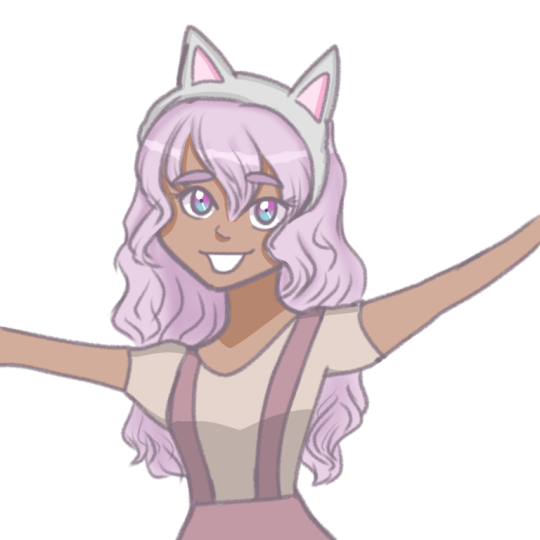
Here is a drawing I made of Ritsu! Isn’t she so cute uwu?
Some points:
Canon tends to have a terrible habit of portraying her innocence in a weird borderline creepy way. Which I heavily dislike.
Ritsu being innocent?? Perfectly fine. But I portray it in more of an endearing way. Such as above with her wearing a cat headband lol.
Most of this is inspired by @/nagisushi who made a lovely redesign of Ritsu that I adored at first sight <3
Giving her a darker complexion? There’s no real reason for it other than why not. It looks so pretty, against the pastel tones that she has too.
Her super wavy hair?? I just LOVE that omg. She looks bright and bubbly.
Also notice that I gave her a huge goofy smile. That’s what I mean by innocent in an endearing and appropriate way.
You can’t see it too well in this pic since I gave her a basic outfit, but I’m really into the idea of Ritsu finding her own indivisible style
In contrast to canon, where she seems a bit generic and dresses in those terrible maid outfits hhhhhhhh
This all ties into the overall theme of her story, which is discovering herself and learning about humanity. Which means knowing who she is as a person now, since she’s not being controlled any longer.
(HMMMM both of my fav girls and they share this rather major theme in their story....Zaina are you ok?)
Anyways yeah to wrap this up before I start raging at 3am, let’s all just let Ritsu be a kid. Let her go through a million phases of styles, ranging from emo to VSCO to try and figure out what suits her. Let Koro and 3-E be super supportive in all this.
Let her be her own individual rather than just some plot tool to support the cast when it’s convenient.......
Ritsu being bubbly, charming, and goofy is everything. I love the idea of her being unintentionally wacky and 3-E just goes along with it.
That’s it for now because I realized I don’t have the right doodles/drawings for some of my other faves lmao. But there will be more~
#assclass#ansatsu kyoushitsu#assassination classsroom#post#yukiko kanzaki#ritsu#meta#man...I never realized until now how similar they are tbh#you can literally just sum up this post#as me demanding for agency to be given to to these female characters who were done dirty#💀🤧🤧🤧#head full many thoughts
30 notes
·
View notes
Note
Hi, the following is a comment from a discourse about how the negative traits of women in media are frequently sanitized or how their flaws are blamed on the sexism of male writers(or blaming it on other male characters) instead of giving them accountability for their actions, by the female viewers/fans. (Sorry it's a bit long and you don't have to answer if you don't want to:))
"Women are not intrinsically good, there’s a novel called Madame Bovary (that is considered one of the best feminist novels of all times) written by Gustave Flaubert (yes, a man), whose lead character is a woman who’s deeply frustrated with her life (spoiler):
She hates her husband, the church, her child, her gender (and what it implies in society) and seeks to have various affairs. She resents her life so much so, that she ends up committing suicide.
Truth be told, the author did not write her to be liked, but to be an example of what happens to young girls who don’t align with society, and yet, Madame Bovary surpassed the initial role it had: she became a memoir of women’s frustrations, of women’s lengths to cruelty (it’s -for what I can remember-, described how Madame Bovary takes pleasure in mistreating her husband, who she hates for his lack of ambition and pride) and how a woman tries to fight an oppressive system.
Madame Bovary, flawed and full of resentfulness that eats her from the inside out, fights against the patriarchal system in an impactful way that make her a unique protagonist.
The idea that women need to be always kind perpetuates the belief that, because of our well-spirited nature, we need protection -either physical or mental, and as consequence, our harmful actions shall receive no punishment.
We aren’t fighting against the patriarchal belief, but we are twisting it to our benefit.
Furthermore, excusing a women's bad behavior or diminishing the negative impact that it has on others is to be condescending of a woman’s capacity to cruelty, which is (behold!) a patriarchal belief.
If readers do not allow female characters to face the consequences of their own actions, choosing instead to blame another (male) character or the (male) author, then they are denying the female characters their agency. If we don’t hold her accountable for such actions, then we strip female characters of actual decision-making: therefore, it’s not about women making their own choices (they aren’t given free will) but forcing them to follow the path we want for them. It’s still controlling the female characters to “protect” them.
In that sense, if women can’t be responsible for their decisions, then women can’t be put in positions of power, since those spaces demand whoever occupies them to be responsible for their actions."
What do you think? I would really like to know your opinion if it's not too much trouble. Thanks.
Hi I think this is interesting but there are many things here that are way too generalised and really annoy me lol.
For one thing, something being "considered feminist" is not indicative of its actual feminist quality nor of if it can be criticised. The whole "and it's written by a man btw" and later on the "female characters' behaviour can't be blamed on male authors" is sus too, it is impossible to remove the context of male authorship from their female characters' characterisations.
Most female characters and real life women are maligned and blamed for anything they do (and for much they don't do by virtue of 'tempting' men into evil!) Who is arguing for women's intrinsic goodness? I'm always a bit sus of these books that feel they must argue that women are not being held accountable.
I recently read a book with a really over the top, dramatic version of Ancient Rome where all the women were scheming, evil monsters responsible for every bad thing that ever happened to Rome. In the afterword, the male author said that many of his portrayals were unfair and against many historical accounts that had vindicated these women but that he found them far more compelling to write as being that evil.
On the other hand, female characters who act on violent or extreme impulses, whether for noble reasons or not, are often the most compelling characters and really speak to women. They often transcend misogynistic texts they come from to strike a chord. One of my all time favourite female characters is Hedda Gabler, written by a man in the 19th century (and called neurotic by Freud) yet something about her boredom, her desire to create meaning within a broken system where she can get no satisfaction, it really speaks to me. Flawed, damaged, dangerous female characters are a favourite of mine, those who actively seek to shape their destiny, regardless of how they do it.
71 notes
·
View notes
Text
Retranslation and Analysis of That Fight Scene
So firstly, I just want to say the subs are not bad and convey the general meaning very well, in a way that sounds natural in English. That being said, there's always some things that get lost in literal translation, and I really want to demonstrate how much depth the Japanese in this scene actually has for Karma and Nagisa's characters.
Basically the TLDR point here is that this fight is very much not about Korosensei. This is completely platonic, I promise I resisted making any shippy points.
Karma: Hey, Nagisa kun, aren't you getting extremely carried away?
Nagisa: Eh? (definitely surprised and bewildered)
Karma: The number one strongest assassin in Class E is Nagisa kun, isn't it? (uses yo here, which suggests confidence in the statement). Are you (very directly yourself, your own thoughts) wanting to quit assassination? Let's think about the talentless others who are desperately trying their hardest to kill him. When you put it like that, it's like a woman who 'has it' telling the ugly ones that they should honestly quit being so desperate to get a boyfriend, that kind of feeling?"
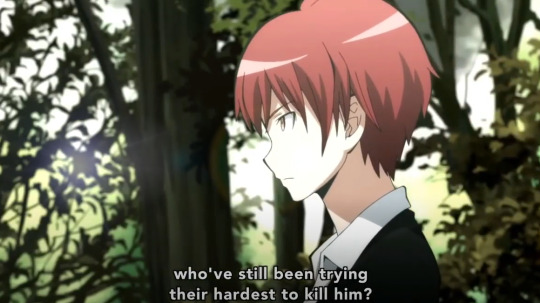
So some interesting analysis here is that Karma says "zuibun", or extremely, when the original translation is "a tad". The translation feels more natural in English, however it kind of makes me feel that Karma's trying to make more of a point. Nagisa has the right to be making suggestions and stepping up, but he's gone so far this time it's crossed a line.
I think 才能がないなり (talentless, saino ga nai nari) is also very interesting. Talent is the best translation, but if you look at the kanji very literally, there's "genius" and "ability". This specific word choice more implies that the other assassins are good, but Nagisa's just another level. Japanese grammar is confusing at best, but essentially 'nari' means become. So you take this as kind of like 'students who couldn't develop genius ability'.
The repetition of 'desperate' is also pretty interesting, linking the examples together better. It emphasises the point that they're kind of at a loss with. He also doesn't directly say attractive woman, he says "motteiru onna", which essentially means the same, but is literally "a woman who has (no object given but essentially 'it'). This more directly reflects to what he's saying about Nagisa, he HAS talent, this unspecified natural quality that makes him better than everyone else without trying.
There's also a lot more rhetorical questions in the Japanese, which got combined into single sentences in the English. The "let's think" thing is very literally what he says, like he's wanting Nagisa to actually consider his thoughts for himself.
Nagisa's original argument and intention may have been about Korosensei. Karma may be genuinely opposed to saving Korosensei. But that isn't the point of Karma's argument at all, he's making this about Nagisa because he's reached a limit with the both of them.
In order to spare you, more under the cut.
Nagisa: T-the aim wasn't... Above all, for assassination, your understanding is always better than mine
Karma: Saying that directly (take with slight pinch of salt - he could have also said "fixing your statement") is irritating. In reality, isn't it that you yourself are the most powerful, and you can't comprehend the feelings of weak humans?
Nagisa: That's wrong (also using affirmative yo here)! That's not what I said! These are my true feelings! Do you hate Korosensei? We went to see a movie together with him, didn't we have a variety of great times?!"
Karma: That's why, that octopus did his best to come and make a fun classroom every time, and didn't give up like Nagisa. Without bloodlust, this classroom wouldn't have been built. Can't you understand the effort?! It's not just your body, are you still a fresh elementary school student?

One thing to note here is that Nagisa isn't actually finishing his sentences. You can absolutely tell what he means because Japanese makes sense like that, but he's still dropping words. Or when he does say a full sentence, they're very short statements. He is desperate here, trying to prove a point he can't actually voice into words correctly.
The context here is that this is before we know their full backstory. Nagisa admired Karma, and he can't quite say it right yet. He thinks they're on different stages still, and Karma is frustrated because Nagisa doesn't see the point.
Karma, after all, does have this inhuman image of Nagisa in his head from years ago. The image of Nagisa looking like some kind of snake demon as he kills Karma in his sleep. He genuinely still, here, believes that Nagisa is purposely hiding this. That's why he keeps putting words into Nagisa's mouth. He's also cutting him off at points, not listening at all to what he's truly saying.
At the same time, Karma starts talking down to him. Instead of saying 'no' (how you'd end a sentence to a friend), he starts using 'kai', which is condescending and how you'd speak to a child. There's an argument here to be made for Karma doing this as a kind of defence mechanism too, but that's very complicated. At this point he really is just trying to get to him.
They are not arguing about killing Korosensei, not at all.
Karma: Huh?
Nagisa: *does the creepy eye thing*
Karma: Eh? What are those eyes? You with the social standing of a tiny female animal, are you defying a human?
Nagisa: I was just...
Karma: If you have a complaint, how about saying it after you win a fight for once? It's aimed at me, so come on. C'mon. C'mon. C'mon!

This is actually one of the most significant changes to the original.
This is the thing, Karma was never calling Nagisa a tiny mouse of whatever, he was just comparing him to one. Because he knows very clearly that Nagisa isn't like that. He sees that look in his eyes and it prompts him, in his frustration, to finally try and bring it out of Nagisa. He's trying to prove a point.
But then Nagisa stops himself. He lets go of his bloodlust for a moment, defaulting to Nagisa as we know and love him, literally turning his head away from Karma.
But Karma's too far gone at this point, he's dragged stuff up his past feelings about Nagisa, the ones he's been hiding for a year to be tentative friends with him, and now he can't let them go. He needs to see Nagisa's darker side plainly, no matter what that means.
It's also important that he says "it's aimed at me". I think this is a little deeper than literal. I think what he's implying here is this entire thing is somehow aimed at him, like Nagisa's trying to strip everything away just for his own perspective.
Obviously at this point Nagisa snaps and chokes him.
Nagisa internal thoughts: Even I...
Nagisa: I'm not going with half my feelings!
Karma: This guy...
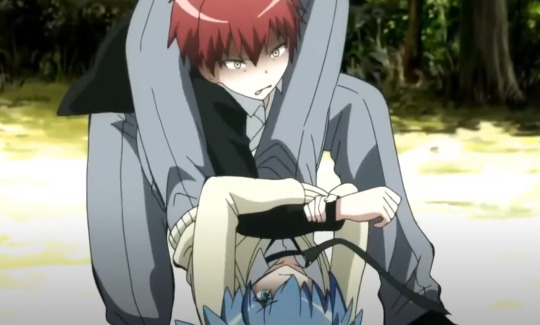
This is also pretty significant. I'm surprised they cut the "even I" part because that says a lot about Nagisa's current feelings. He still doubts himself. He's aware that he's a pacifist, that he's got a lesser social standing, but Karma's put him into a position where he has to stand up for himself. And this is important to him.
Karma smiles when he says "this guy", getting ready to punch him. He feels like he's succeeded, in a way. Though at first he looked genuinely surprised Nagisa actually did it. There's a certain kind of satisfaction that finally he managed to bring Nagisa's 'true' self out.
Obviously at this point they get separated.
So what does all of this actually tell us? Well, pretty clearly here, this is just Karma's issues coming to light. But also a very helpful and useful moment for Nagisa's development as a character. Whether we agree with Karma using him as a punching bag or not, it genuinely does force Nagisa to get some self agency for once.
Karma and Nagisa will never be characters who sit around and talk honestly about their feelings. But even if they're using a whole situation to mask the fact that they very much are discussing their relationship here, it is still a significant moment where pretty much all the barriers they've been putting up against each other drop. They're just still not entirely on the same page through this scene.
Nagisa thinks Karma is just looking down on him and trying to pick a fight. He's baffled and confused as to why Karma feels so strongly against him.
Karma, on the other hand, thinks Nagisa is better than them all and is frustrated when he 'purposely' acts like he isn't. Karma still feels lied to from when they were kids. And he wants to expose it all, to get Nagisa to understand the position his skill puts him in. I honestly don't think Karma ever thought Nagisa was less than him at all, he just knew it would be an easy way to get a reaction. See how he flips tactic from "you're the best here" to "you're a tiny animal" when Nagisa just went into denial the first time?
I'm not going to go into the whole of their actual full fight, but there's some interesting points that reflect back on all of this.
Korosensei saying "your own answer is right in front of you", basically demonstrating that this entire thing really is just Karma and Nagisa
The entire point of the fight was to get one hit in with a knife, but Karma decides to just continuously beat Nagisa instead. Which yeah, is pretty ineffective. Pretty much proves again that it wasn't about just taking a victory.
Karma took Nagisa's hits on purpose, maybe it can be argued that this is trying to make things last longer, to get Nagisa to actually work for it.
Nagisa demands that he listens to what he has to say. And that's right, because Karma was cutting him off originally.
Karma is a super strategist right? And he was genuinely shocked that Nagisa didn't use his bloodlust to take him down. This is Karma. Sure, he's allowed to make mistakes. But this is odd for him. He was so caught up in his own perspective of Nagisa just having that skill that unfairly made him better. But Nagisa literally throws that skill out and beats Karma on his own level, pretty much disproving him. Maybe Nagisa has this special ability, but he's also worked just as hard as everyone else. He's trained to know what assassination means.
Beating Karma like this, on a 'human' level, was pretty much it. Karma stopped fighting back when he realised that, because he was disproven, and pretty much every wall he put up against Nagisa got literally choked out of him. Karma is already known as kind of an ass and a dirty fighter, you really think he'd worry about the others not accepting it if he stabbed Nagisa fair and square? If he cared that much about killing Korosensei, he would have just done it.
Their fight was never about Korosensei.
218 notes
·
View notes
Text
to dance is to unshackle
um, okay—how else do i express this buoyant happiness that Gaya sa Pelikula has awoken inside me? i’m in complete and utter awe. i did not expect a drop of what the sixth episode has brought us. more than satisfying, it’s utterly fascinating. this is quite a lengthy post, but if you have the time, please bear with me. and since we’re already here, let’s fucking dissect the shit out of this:
right off the bat, it’s sweet how consistently written Vlad was the entire time of the show. at the start of the episode, for one, he was concerned with Karl’s disposition, saying, “anong iniisip mo (what are you thinking)?” and, later on, as we know, he pops that question again in this episode. what are you thinking? always in limbo. true, it’s considerate, yet more than that, it’s always a sign of waiting for permission. Vlad has been like this since the beginning: observant and willing to reach out, confident on the surface, yes, but always afraid of going overboard.
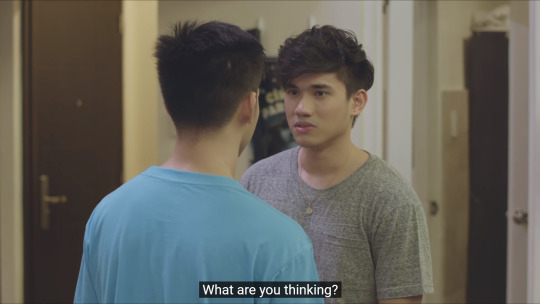
that is not to say that Karl isn’t. in fact, the whole dynamics of their relationship rest on the fact that they can lean on each other and just be honest. many moments show this: Karl’s desire to shift; Vlad not getting into the film lab and Karl knowing something was up; the entirety of Vlad’s birthday; Karl and Vlad’s reticence to open up to Anna, in contrast with how comfortable they feel with each other. in a nutshell, they’re each other’s homes. more on this later.
the part i was most frightened at with this episode was when Karl finally told his parents his desire to shift. to be honest, personally, i wouldn’t know exactly how that pressure on Karl feels, as i was able to study the degree i wanted. yet, back then, i had already known that my parents, who wholly supported me just the same, would have wanted a degree that leaned on science or engineering. that still sucked to know. Karl’s situation is much more complicated. his desire to shift to another course is to make up for lost time, a sense of hurrying before it really becomes all too late. this was a heavy lot to take in. the disappointment and anger in his father’s face when he dropped the bomb was too much to handle. Karl had expected it, yet its impact still hurled shrapnel that he was not able to dodge, sustaining him with several wounds. it would be curious to see how his parents come to terms with his confession. i am certain that a number of people have connected with Karl here.
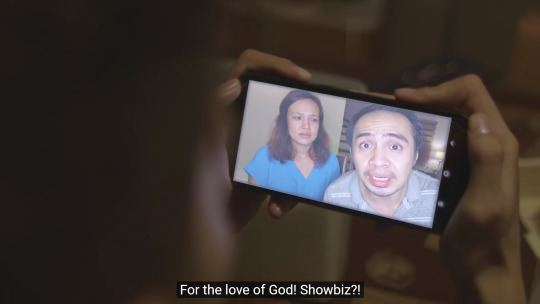
which brings me to another point. Gaya sa Pelikula creates these characters with their own agency. it’s touted as a BL series, yes, but our two main characters’ point is actually not to fall in love — but to live, part of which is to fall in love. they have their hopes and dreams and own burdens to carry, and while falling in love takes centerstage here, we see how they can stand alone, on their own two feet. falling in love is central to their growth, but it is evident that love is not the whole point of their existence.
speaking of which: ate judit. ah, yes, where do i even begin to explain the exquisiteness with which ate judit was written? how, after all of five episodes, it was only now did it make sense why judit was overly, unnaturally caring and protective, a mama bear that would not let anything happen to his little Vlad. now we know why: guilt.
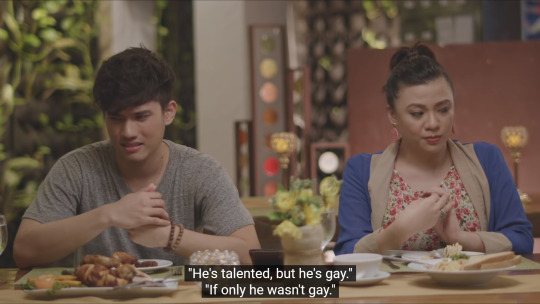

imagine that. being told you were the reason why your whole family went into shambles. there is much vindication in Vlad’s line of questioning, “why would you say that to a child?” (god, i’m tearing up even as i write this.) this was a pivotal scene, with a focal point on judit, the likes of whom we cannot entirely fault for not knowing any better. the fact remains that we are still in an era that fails to understand the spectrum of gender identities and the far utopia that we seek, where gender and sex would not be a damning classification anymore. and for true allies, it is in admitting that they “didn’t know then what [they] know now” that their support gains more strength. it is in confessing where they got wrong, how harmful their actions were, and in the commitment to do more, that their promise is made good.
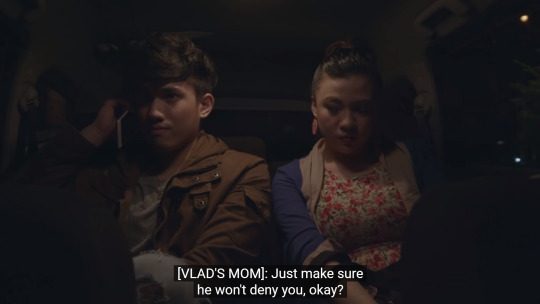
parenthetically, can we talk about Vlad’s mom as well? have you all noticed how her voice broke when she said, “siguraduhin mong hindi ka na itatanggi niyan, ha (just make sure he won’t deny you, okay)?” was that pain, or guilt even? i wonder if we’re ever going to see her. it would be a regret not to. for so long Vlad had thought that he was the reason his father left, and that his mother was mad at his queerness. i wouldn’t want this simple call to be the resolution that the show had for him. at any rate, we have two more episodes to await, so i am not going to strike my gavel on this judgment just yet.
but whereas Vlad found his longtime coming reconciliation with his sister, Karl had no one to turn to. his call to Vlad was a cry for help. it was heartbreaking to see him like this. Karl had always put up a fake smile against any adversity that had come his way. to him, these were trivial matters that would pass, and they did so — until now. after all he was, as we would later come to know, living a script that had been prewritten before he even came to being. that explains his nonchalant demeanor toward life, the seeming discontent behind those dead eyes, and a repeated hinting that he was always yearning for so much more. at the end of the call, Karl instinctively goes to the closet - and his proverbial closet - and sees the skeletons he had hidden inside, drop in a mess.

that it was Karl’s brother who was in the photo shook me. that past was so well thought out. things made so much sense in this episode: why Karl tried to fit in, why everything seemed so fake. why he was so discomforting to watch, even! that made sense now.
and what do you do when everything has become a mess? the once seamless film that had been rolling without any glitches now sprawled on the floor, entangled in a hodgepodge well beyond fixing. when that happens, what do you do? well, you dance.
i have so many things to say about faux masculinity. it is a fact undisputed that in this society, gender roles are still very much pillars that we have yet to dismantle. our genders have been geared toward performativity, and our consolation is the external validation we receive through the acts of fitting in. in the process, we lose sight of what we really want. we blur the lines between what is and what should be, in favor of what society has demanded upon us. Karl took that role and lived by it religiously. yet, those things has gone haywire in this episode. more than his parents, it was to himself that Karl has finally admitted that the act can be dropped now: the fixed posture, those rehearsed lines, that painfully faux masculinity, on guard all the fucking time. all of those things were dropped.
that is not to say that Karl was faking all of it. there is no denying that Karl has been a masculine person most of the time. but the show portrayed before us a discarded femininity that Karl had been trying to bury deep inside him — one that all people who have been and who are still in the closet know by heart. the thing is, all of us have masculine and feminine sides, the expression of which vary at different levels in different situations. sadly, we have been preconditioned to believe that male persons must be masculine, and female persons must be feminine. Gaya sa Pelikula acknowledges this hegemony, and then throws it away all the same. true, Karl may very well be comfortable in his masculine expression, but his femininity must also be allowed to grow. one cannot be complete without embracing the entirety of who they are. many have died — been killed — for simply living who they are. society has long been a vicious environment. but people have also long fought for their fundamental right to perform these things, and through them, we know that things can change. that things are changing.
it is against this context that imprints more meaning, more gravity to when we finally, finally see Karl dance. in every sense, his dance was the show’s climax for me. it is, quite emphatically, freedom incarnate.

when i say i fucking bawled at this scene, you best believe it.
quite important to note: when Karl sees Vlad, he stopped abruptly, only for Vlad to signal to him, in an OK sign, that what he was doing was perfectly fine. that Karl could be effeminate all he wants, and who the hell in this earth should care? this allowance has given Karl all the needed validation he will ever need, at least, for that one night where they could bare it all. it was only the two of them, but the house has never been more crowded, because their feelings have seemingly exploded and have been overflowing in a glorious climax for all of us to witness. in this scene, Karl has unshackled the chains with which he had been bound all that time, and it was Vlad who helped him finally break the last of those chains. in this moment, there was only pure bliss.

(that the song playing here was Ride Home by ben&ben is the perfect giveaway. for non-Filipino readers who have only listened to ben&ben now, check this band out. it’s one of the best bands to have ever come out of the Philippine music industry.)
and, of course, in this waterfall of emotions, it is only perfect to time the moment of their first kiss. they have accepted each other, haven’t they? in a meaningful act (the gravity of which we will only realize in full later when Vlad tells the story of his dad), Karl rumpled Vlad’s hair, but only after Vlad had already consented to it. then, afterward, it was Vlad’s turn to ask, what are you thinking? to which Karl had this—and i know we all expected it, nevertheless—to say: i don’t want to think anymore. then they kissed.

i swear to god. i only watched this for the 92432475781 time.
the denouement was so well put, too: now everything is put back into its own place. Karl’s brother. his death. his parents’ expectations. the substitution. Vlad’s father. his parents’ expectations. the horror of realizing one’s difference. the abandonment. in these stories, it becomes more and more permissible to believe that Karl and Vlad have easily found comfort in each other. to say that they are soulmates (as the creator, juan miguel severo, told on his twitter) is not an exaggeration.
and, make no mistake: Karl and Vlad did not find each other’s embraces out of pity. no. it would be unduly harsh to view them that way. rather, they found solace in each other’s embrace and warmth, but it is still they who will muster the courage to face their own demons. the only difference is, they now have each other to find some sort of release. they are not destructively dependent on each other; instead, they help each other grow into the versions of themselves that they can be proud of.
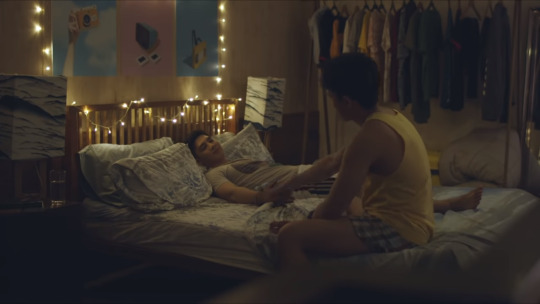
finally, a couple of small things: look at the way Karl was inviting Vlad to lie in bed with him. that simple gesture harks us back to the early days of their dynamics: Vlad had expressed that it was okay to share a bed, but Karl was adamant that they do not. Karl had once dreamed of Vlad joining him there, and that scared him shitless. in contrast to that, now we have this: Karl himself inviting Vlad, and Vlad accepting for Karl’s wholehearted invitation. the moment this happened, there was a consummation of the expression of their love. if they had their doubts prior to this, those could not have been more obliterated now.
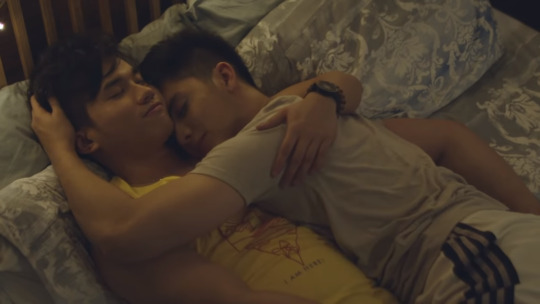
needless to say, i fucking, fucking loved this. as one who has only ever written three fanfics (2gether and History 2!), all of which seemingly related to sleeping (what the fuck, do i have a sleep fetish or something), this ending to episode 6 is just the cherry on top.
their lines by the end particularly strike me. here we have Karl who wishes to create his own stories. on the other hand is Vlad who wishes that he be in charge of the endings, too. how do they do that? who knows? but the certainty that defines their pact is that they shall do it together, unbound and free to dance to the song they have chosen of their own accord. and that simple promise, made in each other’s tight embrace under artificially warm lights amid that early january weather, with no certainty at all of what tomorrow has to bring, has made all the difference.
in 34 minutes, Gaya sa Pelikula has, yet again, done more than we could have ever expected.
i just checked and this reached 2k words. i’m not even gonna attempt to proofread this anymore. anyway, this is all i have to say for now. i just simply cannot let go of the best episode i’ve seen in this show without expressing my own reaction to it.
(also: i’m thinking of writing a fanfic; that is, the morning after. just a one-shot, hopefully a cute one. as usual, an introspection of these characters, and what lies ahead. hope i actually get to write it!)
thank you so much, Gaya sa Pelikula. you are proof that things do change.
#gaya sa pelikula#ian pangilinan#paolo pangilinan#juan miguel severo#fanfic ideas have been brewing inside me#char#bl series#philippines#philippine bl series
172 notes
·
View notes
Text
Book Review: RULE OF WOLVES by Leigh Bardugo
“Love was the destroyer. It made mourners, widows, left misery in its wake. Grief and love were one and the same. Grief was the shadow love left when it was gone.”
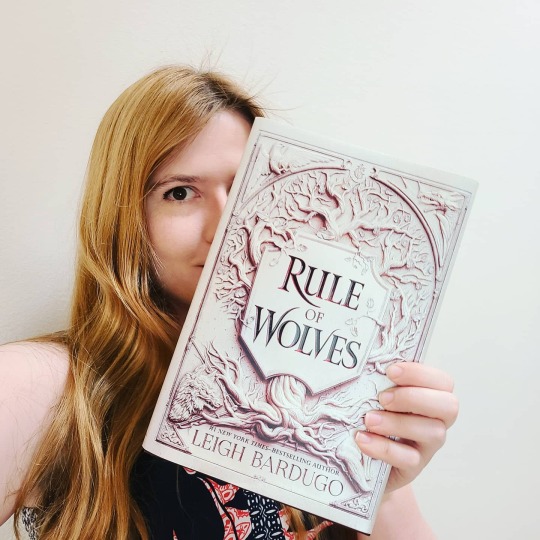
Official summary:
The Demon King. As Fjerda's massive army prepares to invade, Nikolai Lantsov will summon every bit of his ingenuity and charm—and even the monster within—to win this fight. But a dark threat looms that cannot be defeated by a young king's gift for the impossible.
The Stormwitch. Zoya Nazyalensky has lost too much to war. She saw her mentor die and her worst enemy resurrected, and she refuses to bury another friend. Now duty demands she embrace her powers to become the weapon her country needs. No matter the cost.
The Queen of Mourning. Deep undercover, Nina Zenik risks discovery and death as she wages war on Fjerda from inside its capital. But her desire for revenge may cost her country its chance at freedom and Nina the chance to heal her grieving heart.
King. General. Spy. Together they must find a way to forge a future in the darkness. Or watch a nation fall.
---
Watch me gush/ramble about RoW on YATL Live: https://www.instagram.com/tv/CNlVL7Cj6DN/
NO SPOILERS TIL YOU GO BELOW THE CUT. (Or should I say the Fold?)
You know I’m in too deep when I start scheduling my own personal and professional deadlines around the release of a book. I literally organized my life in March 2021 with the single goal of making sure I would be untethered by responsibility and commitment when Rule of Wolves released.
This book, immediately followed by the release of Shadow & Bone on Netflix.... this spring has thrust me straight back into the Grishaverse mania of my younger years.
As a conclusion (...?) to the King of Scars duology, Rule of Wolves delivered on compelling politics, satisfying character actualization, and just deliciously exciting content all around. Bardugo has certainly created a mesmerizing world, and this story sharpened and expanded its details even more.
And if you’ve taken even a glancing look at my blog, you’ll know I might be a little TOO into Zoya Nazyalensky and Nikolai Lantsov. I don’t think it’s a spoiler to say this book was an extremely rewarding end to one of the most intriguing and tear-your-hair-out-in-a-good-way slow burns.
All in all, a hearty thumbs-up from me! If you’re cool with spoilers, follow me below....
Okay, let’s get into this a bit more.
Y’all!!!!!!!!!!!!!!!!!!!!! Look, I can’t understate how invested I am in Zoya and Nikolai both as individual characters and as a couple. Like????!!!!! They are ENDLESSLY interesting and endearing and just off-the-charts incredible.
Like many readers of the original trilogy, I was NOT a fan of Zoya for a long time. She did some messed up stuff, and it wasn’t until we got to be IN her head that I realized the depth and intrigue of her character. Not to be like “Oh, well _____ went through trauma so that excuses and explains why they were mean!”. It’s more nuanced than that with Zoya, and her journey really made me consider (for the first time, maybe) that there are actual upsides to cutting through frivolity and niceties. That’s not to say anyone should intentionally be cruel, but especially seeing her articulate how certain veins of “niceness” can be useless and fake, and watching through Nikolai’s lens as he genuinely appreciates and relies upon her ruthless, straight-to-the-punch guidance, I came to realize how cool it is to see a female character who is good but not nice. There is a world of difference between those two traits, and especially for the now-queen of Ravka, the former is far more important to possess.
And Nikolai, this absolutely enchanting and determined and whip-smart and romantic and brutal guy... the MULTITUDES this man contains!!!! I adore him and his whole arc. Every decision he’s faced with is tremendously difficult, but his cleverness and growing maturity really came to a head in this installment. I loved watching him realize that the only thing he REALLY cares about is having the agency and ability to fix problems and take action. He can be with or without the throne; he cannot be without forward movement. (My favorite bit of the book might just be Alina remarking how Nikolai still technically manages to “keep” the throne even after giving it up, via Zoya’s hand.) So I don’t think we’ve seen the end of “king” Nikolai by any means, and it was enthralling to watch him take on the war in this book through so many angles: engineering, flight, diplomacy, disguise, weaponry, AH!
Of course, I’d be remiss not to bring up the stunningly gut-wrenching midpoint reversal of this book -- losing David. I’ll admit I got spoiled about his death before reading, but not the specifics. I imagined that it might be some emotional confrontation with the Darkling, or defending Genya, but in the end? His was a passive, random death. IF YOU MENTION THE JOURNAL I WILL CRY. And I think that’s exactly why it’s so doubly devastating. To lose such a pivotal character in such a seemingly senseless way really underscores the reality and consequence of a war of this scale and nature. I appreciated all the complicated, no-right-answer reckonings there were in this book about weapons and developing arms. Lots of difficult ethics there for sure, and it’s not a conversation I’ve encountered in many fantasy stories before.
Back to some more FUN stuff, it was of course wonderful to finallyyyyyy witness Zoya and Nikolai get together, and I love the way it was handled. The intimacy and comfort they’ve found in each other just makes me want to burst, and their scenes together (as always) were sharp and electric. God. Their dialogue is just so, so good. It’s a bit bittersweet to know that the road ahead for them will not necessarily be an easy one, given Zoya’s likely VERY long life versus Nikolai’s very human one. That raises lots of questions about the Nazyalensky dynasty’s heirs (?) and whatnot, so I do hope we get to see more of them in the future to see how some of these things are unpacked and discussed. Plus, it’d just be really great to see these two as a more established couple now that they’re “allowed” to be together. (”I WILL LOVE HER FROM MY GRAVE.” That’s cool, Nikolai Nazyalensky. I’m already sobbing.)
Side note: How amazing was Zoya’s reckoning throughout this whole book about resisting love in an attempt to protect herself? I loved how it tied in with unlocking her DRAGON POWERS, and her realization that “you’ll mourn anyway so you might as well love big” was so, SO poignant I’m crying again.
It was of course terrific and exciting to see more of Nina AKA Mila’s action. I thought the reveal about Joran was really difficult but ultimately hopefully something healing for her. I also thought that where we left Nina and her prince was very fitting and I’d love to see where their new lives “ruling” Fjerda take them.
Anyway, it was also really fun to see some Crow cameos, and I’m hopeful based on the way things ended in this book that we’ll get to see more of both the Ketterdam crew and the new/future rulers of Ravka and Fjerda. Crossing all the fingers!
#review#rule of wolves#leigh bardugo#zoyalai#zoya nazyalensky#nikolai lantsov#king of scars#grishaverse
22 notes
·
View notes
Text
Where Are All of the Mothers in Fantasy Fiction?
https://ift.tt/eA8V8J
This is a guest post from Gabriela Houston, the London-based Polish author of Second Bell, a Slavic fantasy debut described as a cross between His Dark Materials and The Bear and the Nightingale. You can find out more about the book here.
Historically speaking, the fantasy genre has a thorny relationship with motherhood. Technically, it’s acknowledged that the protagonists must have sprung from somewhere. But it is often solely their paternity that is seen as important—while the mothers, if mentioned at all, are usually either dead of irrelevant: unmentioned or languishing in a convent somewhere. If the mothers (or stepmothers: a different type of a mother-figure) persist in being alive into their children’s adulthood they are most often presented as an obstacle to their child’s self-actualisation/quest, or, as is most common with the stepmother archetype, present an actual threat to the protagonist.
Since mainstream fantasy as a genre was Eurocentric, this is a trend that is very much connected to the patriarchal structures persisting throughout Europe for most of recorded history. King Arthur, whose legend was first written down in the 12th Century by Geoffrey of Monmouth, had a mother, of course, but her only real importance was in how her beauty drew the eye of Uther Pendragon, who raped her, conceiving Arthur. Since Uther ended up marrying Arthur’s mother, Igraine, story-wise all was considered to be well, and, her role in birthing the future king done, Igraine became an irrelevance, just as any feelings and thoughts she might have had on her second husband. All we know is she was beautiful, chaste and gave birth to the real protagonist of the story.
The courtly love conventions forming the basis of many medieval European legends have seeped into the genre of fantasy, especially high fantasy, and have shaped the way in which female protagonists are related to. In most “traditional” fantasy, motherhood was seen as nearly opposite to personhood. A female character’s value centred squarely on her attractiveness to the male protagonist, meaning that the moment she aged/became a mother, she ceased to hold that particular form of attention that comes from extreme youth and innocence. Motherhood is seen as the end of a female character’s journey. The experiences, shifting relationships and emotions linked to motherhood are not seen as interesting enough to garner any space at all.
In The Lord of The Rings, we are faced with a whole cast of missing mothers. Moreover their absence is not noted as particularly important or carrying any emotional load. Aragorn, son of Arathorn, clearly had a mother, but when his father died he was shipped off to live with the elves. We neither know, nor are expected to care about what his mother thought on the subject. Then, of course, he falls for the elven maiden Arwen, whose mother, we’re told (as an aside) had the good sense to disappear from the scene by sailing beyond the sea before the plot of LOTR begins. Frodo Baggins’ mother helpfully died before he was born and Bilbo Baggins has the rare privilege of having a named mother, Belladonna Took, who, however, is quite dead by the time The Hobbit begins, and is referenced only as a link between Bilbo and the adventurous Took clan. She was a Took and she birthed him. Thus her role ended.
The halls of speculative fiction are carpeted with the corpses of the mothers who died of broken hearts and colds in order to not complicate their progeny’s journey. In fantasy TV and Film the trend, quite naturally, continued. In the original Star Wars trilogy, Princess Leia and Luke’s mother, Padme Amidala lived a full life of adventure but then died of a broken heart shortly after her children were born, as of course she should have done. Can you imagine, had she survived, the plot-spoiling link to their past she would have become? In Buffy The Vampire Slayer, Joyce Summer’s death, whilst arguably the critical highpoint of the series, was seen as necessary. She had to die, or else Buffy might have never become who she was always meant to be. As a mother she was an obstacle, one the scriptwriters helpfully removed.
Occasionally, the death of the character’s mother brings about the advent of the perennial archetype of the evil step-mother. A twisted parody of what a mother should be, just as the dead mother was convenient to the character’s journey, the insertion of the stepmother exists solely to scupper all of the character’s efforts. The examples of the conniving stepmother trope abound in traditional folktales (like in Cinderella, or its Slavic equivalent, Vasilisa, where the young protagonist is sent off by her stepmother to ask a favour of the infamous witch, Baba Yaga), mythologies (think the ultimate evil stepmother, Hera, who habitually persecuted the innocent results of her husband Zeus’ many indiscretions), and, not surprisingly, in fantasy genre as well.
In A Song of Ice and Fire by George RR Martin (which actually does portray an unusual range of mothers with agency), Catelyn Stark, an otherwise fiercely loyal mother, is a cold and distant stepmother to Jon Snow. In the first novel in Katherine Arden’s fantastic Winternight trilogy, the main protagonist grows up in the shadow of her vapid, fearful and cruel stepmother. Part of the reason, I’d argue, why older women are so often portrayed as annoying and conniving, is because, as far as the traditional narratives are concerned, the whole of their role and purpose is fulfilled the moment their physical (youthful) attractiveness wanes. Those without the wisdom to exit the stage by dying become at worst a cumbersome plot bunny and at best an obstacle.
The issue of a lack of older women in fantasy is such an expansive subject that it demands the respect of a separate thought piece, really. And, as regards the stepmothers, I’m not saying, of course, that they should always be portrayed as kind and loving. But precisely because their archetype is rooted so strongly in our collective consciousness, it’s particularly important to acknowledge their humanity. And as far as the humanity of the older female (in the traditional fantasy fiction this seems to describe any woman over twenty) character goes, the good news is the tide is turning.
Part of the reason for that is that more women than ever are given the platform to write their stories. Perhaps somewhere along the way the publishing industry as a whole realised that as women account for the majority of fiction readers (according to one cross-Atlantic research they make up to 80% of fiction market), then perhaps portraying women as actual people, whose agency doesn’t evaporate once they get pregnant, might simply be good marketing.
In the recent years I’ve been ecstatic to see nuance brought into the motherhood trope within the genre. Where the mother of the character is dead, she is so for a damn good reason, with the echoes of her absence reverberating through the story in the most compelling ways, like in Tracy Deonn’s Legendborn. Mothers fight beside their children, and grandchildren (Like the pink-haired protagonist of The Phlebotomist by Chris Panatier), and battle hardship and heartache, like in Madeline Miller’s Circe.
As a mother it was important to me to focus on the humanity of motherhood in my debut, The Second Bell. The mothers I wrote are not perfect, and they are not always right. And even when they are, they might not know it for certain. And that is the point. Mothers deserve their place in fiction not because they’re perfect, but because they are human. Their decisions are just as complex as their younger counterparts and are complicated further by their new and life-changing bond with their child.
cnx.cmd.push(function() { cnx({ playerId: "106e33c0-3911-473c-b599-b1426db57530", }).render("0270c398a82f44f49c23c16122516796"); });
Writing mothers is writing humans. No more, no less. They matter and they are worthy of notice.
Second Bell will be released on Tuesday, March 9th. You can find out more about Gabriela Houston here.
The post Where Are All of the Mothers in Fantasy Fiction? appeared first on Den of Geek.
from Den of Geek https://ift.tt/30r63n4
8 notes
·
View notes
Note
much ado for the ask game 😳😳
THANK U FOR THE ASK...
MUCH ADO ABOUT NOTHING: Go off about the best female character
okay i am a HUGE lesbian so like... all of them??? billy shakes writes a woman and i fall in love with her case closed. ophelia? iconic. lady macbeth? showstopping. beatrice? fucking superb.
that said i want to take a second and go off about a female character who imo doesn’t get enough attention, that being gertrude from hamlet. because my god gertrude is such a fascinating character. there’s so much about her that’s up for interpretation. does she know claudius is a murderer? did she help him? is she completely unaware? does she purposefully choose not to see what’s going on or is she tampering behind the scenes in the castle? does she really love claudius? does she know the wine is poisoned?
and the last one in PARTICULAR drives me INSANE because it highlights all of these parallels between ophelia and gertrude in a way that absolutely destroys me! both of them are women and thus relatively less powerful in elsinore; both of them have to cope with the demands of the men around them (polonius, laertes, hamlet sr, claudius); both of them were once beloved by hamlet (ophelia textually speaking but with gertrude i at least. assume?) but have now been forsaken by him, and they have to watch him completely crumble to pieces.
and gertrude is the last person to see ophelia alive. thinking about this makes me start foaming at the mouth. gertrude is the only person to see ophelia die, and by giving her the monologue about ophelia’s death, shakespeare has linked the two women of the play in a MAJOR way. because gertrude is the one who finishes telling ophelia’s story. she chooses to present ophelia’s death as an accident, ostensibly to protect her, because later on we see that suicides aren’t given proper burials and etc. but, like, we don’t KNOW bro!!! did ophelia kill herself? did she drown accidentally? did she flee denmark? we don’t fucking KNOW and the fact that gertrude is the one who speaks on ophelia’s death makes me CRAZY
AND THEN HER DEATH SCENE. and again, there are SO many interpretations of this, which is part of why hamlet is such a fantastic play. but. like. the idea that both ophelia and gertrude knew exactly what they were doing. and were taking agency in the only way available to them. and killed themselves or allowed themselves to die as a final way to Get Out Of The Mess, or even as a fuck-you to the rest of court (the idea of gertrude’s death being a big middle finger to claudius lives in my brain rent free)..... it’s just. i need to lie down thinking abt this
#max.txt#THANK YOU SO MUCH FOR THE ASK AGAIN IM SORRY I WENT OFF THE SHITS ANSWERING ASHDFBDSBFWBFBBFWB#shakespearepdf#hamlet#ophelia#gertrude#suicide mention#(fictional)#asks
20 notes
·
View notes
Text
Y’know, I’ve been trying to work myself up to writing about Nalindri’s experience through her origin, but every time I do, I get intimidated by how deeply unsettling the Tabris origin truly is. It is, without contest, the most horrifying, especially if you play through the female route. In all other origins, no matter how depressing or depraved things can get, you still at least *some* sense agency. You still have ways to turn the situation around for yourself (up until the plot events that force you to join the Grey Wardens, that is).
Cousland gets to enjoy a peaceful day with their family, exploring all the odds and ends of their castle. Aeducan spends their whole day flaunting around as a noble, and the player gets to decide how passive or active their role was in their brother’s death; you get to decide their very innocence in the matter. Mahariel is an active member of their Dalish clan, just going about their business and living life as according to their culture.
Even for the more dire Origins, Amell/Surana and Brosca still have a better time than Tabris. For Amell/Surana, despite being confined to a Circle being a complete travesty, your tragedy in your origin comes from your decision to either help or deceive Jowan, and you have the choice to enjoy your life in the Circle even if it means your character’s ignorance to the abuses inflicted upon them. No matter how horrible the Circle truly is, your character is allowed to be ignorant of it, and they are allowed to be sickeningly happy and accepting of their lot in life. Brosca is forced into a gang for survival and is basically an indentured servant, but Brosca still has ways to turn the events leading up to crossing their boss in their favor; you can even go as far as to cheat the boss of the damn Carta out of money and keep it for yourself, so your Brosca doesn’t have to be a helpless lackey with no choice, they can actually be working the system in their favor. These origins, as miserable as they are, both give you a choice of how life is perceived by your character, and your character has the option of flourishing within the constraints of their oppressive systems. (That’s not to excuse these systems, fuck the caste system and fuck the Circles, this is merely to compare the in-character outlook to the Tabris origin.)
But Tabris doesn’t have the options offered to the Amell/Surana or Brosca origins. Both of those origins present an illusion of a future where your character can work their way up a hierarchy. There is no hierarchy for Tabris. There is no system to work around, and there’s not even the illusion of hope. Only an abysmal stasis. You are told that you must get married and settle down because there are no other options. You don’t even get to pick who you marry. You don’t get to pick someone that makes you happy. You’re told from the start that there is no hope for you, no hope for your family or your friends, and it’s reinforced throughout the origin. The inciting event in the origin doesn’t even give you a choice as to whether or not your role is passive or active, because you are always victimized, especially in the female route.
Amell/Surana can choose to work against Jowan in an attempt to stay in the Circle’s good graces, if that’s what they wish. And though it was demanded by plot, it was ultimately Brosca’s choices that angered Beraht. Tabris’s choices mean nothing until the climax of the Origin. They had little to no agency in terms of action, only their response to what happened to them. The whole time, all of the tragedy that befalls them does so not because of their choices, but because they were merely living as a disenfranchised person in a prejudiced land. Which is a similar theme in the Amell/Surana and Brosca origins, but as mentioned, the climactic events happen not because of who they are but because of what they *choose* to do, even when some things are shoehorned for plot purposes to force your character into the Grey Wardens. Until the Tabris climax, you don’t get to choose whether or not your character incites the things that happen to them. You are victimized and forced to kill, and the only true choices you are given at the end is whether or not you should excuse the monster who abused you and your friends and if you should shoulder the blame for your own victimization or implicate the cousin that suffered through the bloodshed with you to try and save your own skin.
Next to Tabris, I do say that the Amell/Surana and Brosca origins are the most horrific and are extremely abusive of their persons. The whole concept of Circles is fucked and what agency I do mention Amell/Surana having is incredibly limited. Brosca’s origin is absolutely fucked too, as is the caste system they are born to. But playing as Amell/Surana, I always have the impression that had they stayed in the Circle, they could have risen to the highest ranks. Playing Brosca, I always got the impression that my Brosca was either going to leave Orzammar and find freedom or rise within Beraht’s ranks and eventually have enough power to take him out and run things themselves. But for Tabris, you have no choice. These bad things are going to happen to you and there’s no way for you to make things better for yourself. You have to put up with it until literally the worst thing possible happens and forces you to leave or die. Nothing works to your advantage. There is no making lemonade out of the shit lemons life gives Tabris. It always feels inescapably hopeless for them. That’s why, through my own personal experiences playing DAO, the Tabris origin is always the one that unsettles me the most.
2 notes
·
View notes
Photo
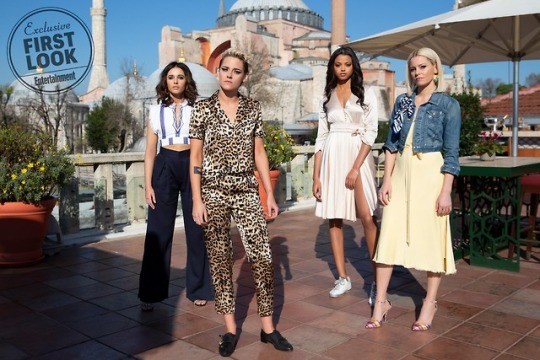
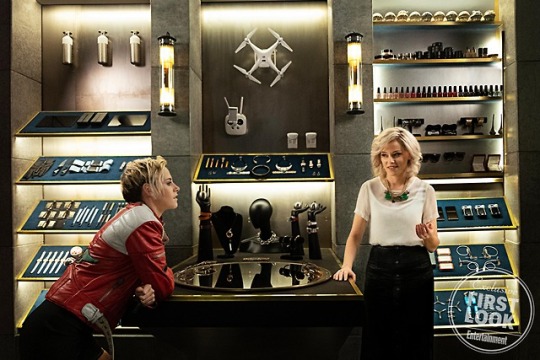

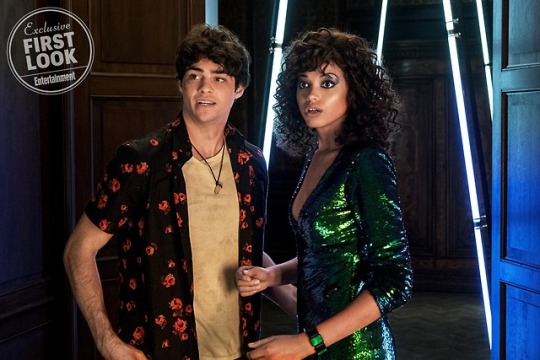
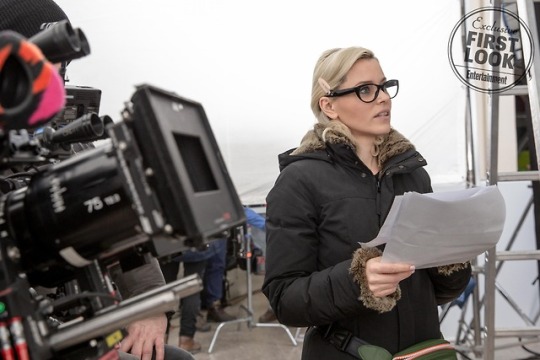
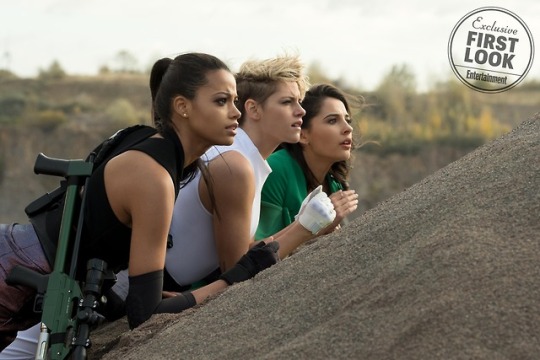
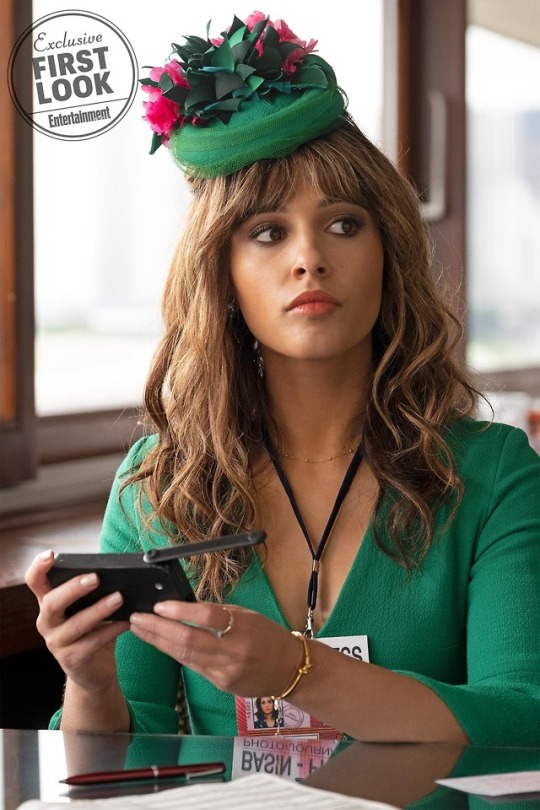
(via Charlie’s Angels 2019: See Kristen Stewart in Elizabeth Banks’ remake | EW.com)
Charles Townsend, the titular Charlie of Charlie’s Angels, has turned the Townsend Agency into heaven on earth. No, really: In director Elizabeth Banks’ upcoming take on the elite all-women crime-fighting team, the camera-shy millionaire doling out missions has become — by conservative estimate — a gazillionaire.
It’s only logical. As Banks puts it, her update isn’t a reboot or a remake of the beloved franchise, but rather a “continuation” that incorporates the events of the original 1970s TV series and the McG-directed 2000s films. And so, she imagines, in the more than 40 years since Charlie assembled his first trio of Angels, he must have given his operation a makeover. “If you were rich in 1976, you only got richer,” Banks, who co-wrote the script, says with a laugh. “Charles Townsend is richer than ever, so he’s grown the business into a global spy agency.”
His expanded roster includes the crew at the center of Banks’ story: Sabina Wilson (Kristen Stewart), the hard-partying, highly skilled wild card; Jane Kano (Ella Balinska), the ex-MI6 muscle of the group; and Elena Houghlin (Aladdin’s Naomi Scott), the MIT-trained scientist who, Banks says, serves as “the heart of the movie.”
Charlie’s call takes them around the world, with stops in Istanbul, Hamburg, and Berlin, but amid all the globe-trotting, Banks was most invested in showcasing the trio’s teamwork. “It was important to me to make a movie about women working together and supporting each other, and not make a movie about their romantic entanglements or their mother they don’t call enough,” she says. “When I’m at work, I don’t talk about those things. I get on with my job. It felt important to do that for the Angels, to treat them with the respect their skill set demands.” Judging by this first look? Mission accomplished.
WHO’S THE BOSLEY?
Banks, Patrick Stewart, and Djimon Hounsou, that’s who. In Charlie’s history, multiple actors playing multiple characters named Bosley have aided the Angels. To Banks, it felt natural to upgrade the name into a title. “‘Bosley’ is now a rank in the organization, like lieutenants,” she says. “All of the Angels have been played by different women and have had different names, but the Bosley character was always named Bosley no matter who played him. We thought, ‘Well, that must mean it’s more than a name.’” Above, her Bosley helps Stewart’s Sabina gear up.
DRESS TO IMPRESS
It wouldn’t be Charlie’s without Angels going undercover. Here, Sabina (Stewart) suits up at a Turkish derby, where the trio tail a target until “chaos ensues, as it always does,” Banks teases. That chaos, though, won’t look like the over-the-top sequences of the 2000s films; the director says she took a “grounded” approach to stunts: “I wanted to make them distinct from superheroes, aliens, and mythological creatures that are in a lot of action movies now.”
In fact, the Mission: Impossible franchise’s blend of grit and humor inspired her group’s dynamic. “We talked a lot about [those movies],” Banks says. “Those films work best when the team is together, when Ving Rhames is in it, and Simon [Pegg] is in it, and Rebecca Ferguson. That sensibility really matters to me.”
TOP SECRET
When asked what Noah Centineo (To All the Boys I’ve Loved Before’s breakout star) is doing in this scene with Balinska’s Jane, Banks gets tight-lipped. “I don’t want to give too much away about Noah,” she says of his character, Langston, “but he’s a friend mostly to Naomi’s character.” The Angels clearly have plenty of allies, but that doesn’t mean they can’t accomplish their goals on their own. “I mean, women can do anything,” Banks says. “That’s not just my personal belief. That’s the core belief of Charlie’s Angels.”
POWER-FUL REUNION
The last time Banks collaborated with Scott, in 2017’s Power Rangers, she played supervillainess Rita Repulsa to Scott’s Pink Ranger. This time, they’re on the same side: Banks costars as one of the Bosleys (see above) assisting Scott’s Elena, who plays a pivotal role in catalyzing the central mission. “I wanted somebody who I felt the audience wants to root for,” Banks says of casting Scott. “She’s getting to be this Everywoman who’s also very fun and very funny.”
GIRL POWER GALORE
Banks’ film marks the first Charlie’s entry on the big screen to be helmed by a female director. “It’s a really exciting moment for female-driven films,” she says, citing Wonder Woman and Captain Marvel as recent examples of box-office successes. “Audiences are really looking for those aspirational stories about real and relatable characters, and I think the women in my movie are definitely real and relatable, but most importantly, I think they’re really fun.”
They’re certainly having fun: Just look at Sabina’s array of wardrobe (and identity) changes across these photos. “I wanted Kristen to show off a side of herself you don’t often see in her movies,” Banks points out. “She’s really funny in this.”
GOOD MORNING, ANGELS
John Forsythe, the voice of the Angels’ enigmatic boss in the ’70s series and the 2000s films, passed away in 2010. But don’t worry: Banks has a plan for her installment’s Charlie. “The voice will sound very familiar to you,” she teases. “We tried to emulate John Forsythe’s voice as best as we could. We want a real sense of continuity in the movie.” After all, as seen in the image above, the Angels answer the call.
16 notes
·
View notes
Note
🔥 St John Rivers.
ok, so aside from me hating him so so much because he’s the fucking worst (seriously, this guy tries to manipulate jane into going to india with him by exploiting her faith, how are we all gung-ho for dragging my problematic fave rochy to hell and back but not this guy???), i feel like in most adaptations (i.e. the 2011 and 2006 adaptations, since they’re the only two i’ve seen which apply here), the filmmakers go for ‘repressed vicar trying to berate our Modern Woman Jane with Religion when she’s far too Modern and Proto-Feminist to need That’, when, like. guys. the author was a minister’s daughter and rochester’s redemption is explicitly tied to his becoming a true christian and not just going to church three times a year, it’s not exactly a faithful adaptation.
(i also have feelings about aoje!st. john, who was called . .. . simon??? sheesh i need a rewatch he wasn’t a minister at all, but a doctor. jane was still a christian, but she was also a former nurse who had retrained as a tutor, so there was a similar kind of dynamic if i remember correctly. although, simon was much less of a dick overall and was actually pretty nice, as far as i recall)
in support of this, i am going to copy+paste the relevant section from a dissertation i did in advanced higher english under the cut. now, when i say ‘dissertation’, what i really mean is 4.5k of close reading which only cites two secondary sources, because i was only 17 at the time. but i think this is relevant. and also i’m eternally frustrated about this.
fair warning – this is almost 1k long, but it’s all of my religion section about jane eyre and it all felt pretty relevant. also, the ‘lucy’ and ‘madame beck’ referred to are from ‘villette’; my dissertation was contrasting treatment of women and religion between the two.
(oh and besides all of that st. john’s also a freaking moron who can’t even spell ‘hindustani’ correctly like jesus dude you’re not only learning the language but teaching somebody else as well, get your head out your fucking arse)
[…]
This religious conflictis similar to the one that Jane in JaneEyre faces. However, Jane’s struggle is more personal than Lucy’s as shestruggles against different creeds of the same Protestant belief, and has toface the opposing ideals of Mr. Brocklehurst, St. John Rivers and Mr.Rochester. Her own sense of morality with regard to the Bible is instilled intoher by Helen Burns, who introduces her to Christianity and urges her “to endurepatiently a smart which nobody feels but yourself.”[1] However,Jane is often pressured by the men around her to change her creed to one thatthey find more suitable. This illustrates the role women had in society as themajor men in Jane’s life all seem to think they know what is best for Janebetter than she does. This is similar to the experiences of many women of thetime, as they were often seen as incapable of making important decisions withouta man to help them. In Jane’s first exchange with Mr. Brocklehurst, when sheremarks that she personally does not find Psalms interesting, Brocklehursttells her
“This proves that you have a wicked heart; andyou must pray to God to change it: to give you a new and clean one: to takeaway your heart of stone and give you a heart of flesh.”[2]
Jane also disagrees with St. John Rivers on thecorrect way to fulfil Christian duties, for he believes
“that the more acrid and unreclaimed the soilwhere the Christian labourer’s task of tillage is appointed him […] thehigher the honour.”[3]
St. John’s metaphor of an empty field connotesboth simple farming life, the kind he grew up alongside and which he detestsfor its boredom, and adventures on unnamed shores which explorers often claimfor themselves, the kind of stirring, interesting life St. John dreams of andis so disgusted by. His vision of correct Christian duty is to work steadilyand hard at what he has a talent for because it is his duty, not necessarilybecause he enjoys it. In the same vein, he continually urges Jane to follow hisexample. If he had his way, Jane would never have a moment’s idle rest, so thatshe always turns:
“to profit the talents which God has committedto [her] keeping, and of which He will surely one day demand a strict account.”[4]
Jane’s battles against St. John and Brocklehurstecho Lucy’s struggles with alienation from Madame Beck’s pensionnat. Both Jane and Lucy struggle with opposing views onChristianity and religion to the people around them at critical stages in theirlife, although Lucy is often more vocal about her qualms with Catholicism.
Jane also struggles withMr. Rochester’s irreligious values, especially with regard to the potential shehad to become his mistress. Rochester is without doubt unchristian in hisactions, whether it is his several affairs with foreign mistresses or hisattempts to make Jane wild with jealousy by cruelly pretending to be in lovewith Blanche. He also has a fundamental difference in his belief of Christiandoctrine, as he believes his attempted bigamy “will expiate at God’s tribunal [.. .] my Maker sanctions what I do.”[5]Jane begins to let her religion fall by the wayside in the days of theirengagement, as she “could not, in those days, see God for His creature: of whomI had made an idol.”[6] Thismakes her struggle with her Christianity all the more difficult when the timecomes. Jane’s conflict is between her values and her desires, and she is awareof God’s judgement of her desire to be with Rochester almost immediately. Janesays her hopes of a happily married life are utterly destroyed
“– struck with a subtle doom, such as, in onenight, fell on all the first-born in the land of Egypt,”[7]
However when she does decide to “keep the lawgiven by God; sanctioned by man,”[8]Jane’s main struggle is over. This suggests that Brontë herself believes thatfollowing the Bible is always the right thing to do, and this is reflected bothin Jane Eyre through Jane’s strugglewith Rochester, and in Villettethrough Lucy’s struggle against Catholicism. Her difficulties with her romanticinterest differ from Lucy’s, as Jane and Rochester only really disagree aboutreligion at the climax of the novel, whereas Lucy and M. Paul have arguments continuallythroughout Villette, with theirdisagreements coming to breaking point in the last few chapters. However, theirresolutions are similar, as the men in their lives eventually learn to accepttheir faiths.
Jane advises Rochesterto “trust in God and yourself. Believe in heaven. Hope to meet again there,”[9]and when they are reunited at the end of the novel, Rochester has begun “toexperience remorse, repentance; the wish for reconcilement to my Maker.”[10]His acceptance of Christianity marks the end of Jane’s struggle with him, andthis is signified by her emotion at hearing Rochester call to her at theRivers’ house, as
“the wondrous shock of feeling had come like theearthquake which shook the foundations of Paul and Silas’s prison.”[11]
Thissecond Biblical reference symbolises that Jane and Rochester’s union,previously cursed by God for Rochester’s bigamy, is blessed both because theyare free to marry each other, and because their previous inequalities have beenerased by Jane’s inheritance. While some women had a social status thatequalled or exceeded Jane’s at the end of the novel, their lack of politicaland social empowerment meant that society’s expectations of them were verylimiting; for example, women were not allowed to vote and so had no input increating the laws which directly affected them. However, an ending where thefemale character has her agency preserved throughout, and achieves independencefrom a man in the 1800s was practically revolutionary.
[1] Charlotte Brontë, Jane Eyre, Amazon, p 39
[2] Jane Eyre, p 23
[3] Jane Eyre, p 259
[4]Jane Eyre, p286
[5]Jane Eyre, p186
[6] Jane Eyre, p 200
[7] Jane Eyre, p 216
[8] Jane Eyre, p 232
[9] Jane Eyre, p 231
[10] Jane Eyre, p 328
[11] Jane Eyre, p 308
#asks#cinderellasfella#jane eyre#sorry i just kind of leapt head-first into this#but i will never not care about jane eyre
8 notes
·
View notes
Text
In anticipation of the release of Louise O’Neill’s feminist retelling of The Little Mermaid, The Surface Breaks, we spoke to Louise about re-inventing fairytales, feminism, and the importance of owning your voice.
Why did you choose The Little Mermaid as inspiration for The Surface Breaks?
Louise: Well, it was the summer of 2016 when the editor and director of Scholastic in the UK contacted my agent and asked, would I be interested in writing a feminist retellling of The Little Mermaid? It’s funny, because I should have said no! I was knee deep in writing Almost Love [which came out in March of this year] at that stage, and I was thinking about saying no. I had wanted to take 2017 and concentrate on Almost Love, which was my first novel for adults. So it was a bit of a transition. But I really couldn’t refuse the offer, because I’ve always loved The Little Mermaid. We lived right on Inchydoney beach until I was four: And I was obsessed with the water from when I was a child.
I would stare at the sea for hours and hours and my Mam always used to say, when I was very young, and she was giving me a bath, I was always much more settled in water.
And then in 1989, the Disney version of The Little Mermaid came out. I was four at the time, so I was at a prime age for it. So the idea of The Little Mermaid really embedded itself in my psyche at a very impressionable age. So when Scholastic came to me and asked if I wanted to do this, I just couldn’t say no. As I said partly because I loved the story so much, but also because as a teenager, with a burgeoning sense of feminism, I began reexamining the fairytales like The Little Mermaid, which was always my favorite one. It became increasingly obvious to me that it was very problematic. It’s literally about a young woman who gives up her voice and silences herself to be in a relationship. And she mutilates her body, so that a man she barely knows will fall in love with her. So I think there were really interesting parallels there with what some young women go through today in contemporary society. I felt that it was ripe for a feminist retelling – and I really wanted to be the one to do it.
Your little mermaid, Gaia’s, character is driven, not just by love, but also by desperation, a need to get out of a dangerous situation when she chooses to become human and leave the sea.Was that something you were consciously thinking about?
Louise: Absolutely. It’s funny, someone was asking me recently, why all of my books are about someone who is trapped? I think it’s just a feeling with that I can really identify with, as a young woman, feeling really trapped by society, feeling you’re trapped by your family circumstances, by geography, by things that often feel very much outside of your control. And, particularly for women, you might feel like there are gendered expectations on you on how you should behave, and how you should look, and how you should feel.
It can feel very restrictive. It is for Gaia, growing up in that society, which is incredibly patriarchal, and having such a controlling and overbearing father who basically sells her to the highest bidder. He sells her body to a much older man who finds her attractive. So she is absolutely desperate. I think there’s an element of that in her decision, I mean of course she finds Oliver incredibly attractive and she does feel physical attraction to him, but I think she’s very quick to label it love. But she’s just so desperate to get out of her situation.
Her father is very much portrayed as the villain in this retelling. Was that an interpretation of the original story or inspired by the domineering father portrayed in the Disney version?
Louise: I suppose it was a bit of both really. It was also that I wanted to portray cultural ideas of domination and overbearing fathers.
I suppose, in a lot of ways, he is the embodiment of the patriarchy, he is the embodiment of white male privilege and the embodiment of the idea of hereditary wealth and privilege and entitlement. He really does feel that he is entitled to control his daughters in that way. There are definitely shades of it in the Disney version, but he is still quite a sympathetic character. Whereas in my version of it I wanted to have that sense that Gaia is a really trapped character. So much of that comes from her father, who believes he has the right to control her body, control her destiny, and make decisions about who she should be with. It was an interesting way of critiquing the patriarchy.
It’s literally about a young woman who gives up her voice and silences herself to be in a relationship.
On the other hand, for the sea witch, Ceto, gets a much nuanced portrayal, she is given much more of a redemptive arc.
Louise: It’s funny because you see the Disney version and it’s really interesting to contrast what you know as a child and what you know as an adult. Because Ursula is a villain when you’re a child but when you’re an adult Ursula is the best character in the entire movie, she’s such a badass! I did a lot of research before I wrote the book, not just research about mermaid mythology, but also read a lot of academic essays about fairytales and the didactic messages that are contained in them for women. There were some really interesting points made about the role of the witch in fairytales, it is a very sexist and agist portrayal. It portrays women as always being in competition with one another. If a woman is older and unmarried then the only thing she can do is move to the fringes of society and live there, plotting her revenge. So I wanted to reclaim the witch. I wanted to reclaim the mermaid as well but I actually think while writing it the witch is the most interesting and compelling character in the book. I wanted to explore other reasons why she has been ostracised.
For me, the reason she has been ostracised, is that she is a woman who inhabits and owns her sexuality. She’s also a proud and beautiful fat woman which I think is something that can be slightly looked down on in our society. She is also a woman who demands to live on her own terms. She doesn’t try to acquiesce to societal demands and that can often lead to being ostracised and having to live on the fringes of society. As she says in the book, the most important thing a woman can do is live true to herself.
Gaia comes to that knowledge throughout the story, which she ends in a position of strength even though she has lost and sacrificed a lot to get to that point.
Louise: I agree. This is probably the most hopeful, or the most empowering ending I have had out of all of my novels, particularly my YA novels. I think it’s interesting when you look at the story again. When I was preparing to write the book, I read and re-read the fairytale again and again. I listened to it over and over again, while I was at the gym, while I was in the car. So within a few weeks I could practically recite the whole thing verbatim. When you look at the original fairytale, she’s quite a passive character, the act of going to the sea witch is the only time she really demonstrates any real sort of agency. So the reason I ended it where I did was that I didn’t want to see her as passive and I didn’t want to see her as a victim. I wanted to see her as just a girl, a girl who wanted to take up more space in the world and not less. A girl who wanted adventure and love.
I didn’t want to see her as passive and I didn’t want to see her as a victim. I wanted to see her as just a girl, a girl who wanted to take up more space in the world and not less. A girl who wanted adventure and love.
She wants the truth of things, she wants to find out what happened to her mother. And it sounds like such a cliché but women are so incredibly strong. I have friends who have had children and even that alone I think is just the ultimate act of strength, even that that women’s bodies can do that, it is just strength. And I have friends who have been victims of sexual violence, who have had horrible things happen to them, but just have resilience and strength. I think women are warriors and I really wanted to portray that in this book.
I think the patriarchy really wants to keep us weak and afraid because it makes us easier to manage and easier to control. But I think that absolutely all of us have a core of strength inside of us.
What was your writing process for The Surface Breaks?
Louise: I’d never started a book with the narrative framework already done. I knew that it was going to be a fairly straightforward re-telling of Hans Christian Andersen’s original fairytale. I knew there were certain beats I had to hit: her fifteenth birthday, the shipwreck where she sees the prince for the first time, going to the sea witch and taking the potion, etc. So that made it a lot easier for me, when I sat down to start writing. I finished the first draft of Almost Love on a Thursday, I gave myself the Friday off because it was my birthday, and then I started on The Surface Breaks on the Monday. Because I had the basic narrative set out for me, I could just let my imagination go wild in between. It was really fun. I had a lot of fun with the names, I had fun with the character development, like with the sisters, trying to make them all different and give them their own personalities, independent of each other. I would have the characters very well fleshed out before I start any book, I feel like I know them really well.
I think the patriarchy really wants to keep us weak and afraid because it makes us easier to manage and easier to control. But I think that absolutely all have a core of strength inside of us.
Fairytales were originally told by women, by housewives by hearthside, and were then collected by men. The most famous fairytales had female protagonists. Do you feel like it’s time that we are reclaiming these fairytales with a feminist perspective?
Louise: I really agree with you, I do feel like it’s time. As you said, it’s interesting that fairytales would have been traditionally written and told by women about women and concerned themselves with issues that directly affected women at that time. May that be marriage or children or poverty. Then you see them appropriated by men and see them skewed to stick guidelines about how young women should behave. And it’s interesting that these stories are so much a part of our cultural consciousness. Most children will have been given a book of fairytales at some point, so these stories are very, very familiar. As an author and as a feminist, as you get older, you start to really look at the stories you were told as a child and see how damaging some of the messages in those could be and wonder about the affect that they had on you.
For me there is a sense of responsibility of wanting to reclaim the story and give it a more satisfying but also an ideologically sound twist to it
So for me there is a sense of responsibility of wanting to reclaim the story and give it a more satisfying but also a ideologically sound twist to it, so that any young woman who would read my version of The Little Mermaid would not be left feeling that their prettiness, or their beauty is their only ticket to success. That there are so much more important aspects of being a woman and being yourself.
Sometimes when I say to people I’m writing a feminist version of The Little Mermaid, they say back to me, ‘Oh for god’s sake, political correctness gone wrong, what was wrong with the original?’ But it just feels a little short sighted, I mean children are like sponges, and saying that they don’t understand or that they can’t absorb the messages in these stories is really reductive. The problem is is that they can. Particularly for little girls, when the only role models they see in popular culture or in books is the perfect princess figure. It’s a very heteronormative story. Even if you look at Rapunzel or Sleeping Beauty, there is the idea that you have to wait for a man to rescue you, or wait until you fall in love in order to be happy or in order for your life to begin.
It’s important to look at these stories a different way, these stories that have been with us for so long. Given #MeToo and #TimesUp it really feels like the right time for these stories to be told and given a new lease of life.
Louise: I totally agree. In the last year with the #MeToo movement when women are speaking out, now more than ever a story of a woman who gives up her voice and allows herself to be silenced, that has to be reclaimed. I think it’s so relevant and so important. Because so many women, we have been silenced, our voices have been quietened and it has just come to a time where we’re just so unwilling to accept that anymore. We’re speaking up, we’re speaking out. And we’re raising our voices, demanding that we be heard, and believing that we deserve to be heard and our stories deserve to be shared.
With Gaia, she has so much regret over the fact that she has given up her voice. And I think she comes to realise as the story unfolds that her voice was one of the most important attributes that she had, and one of the most important tools that she had. I think that that’s something that is really important for her and other young women.
Best piece of advice you’ve ever gotten?
Louise: Other people’s opinions of you are none of your business.
Other people’s opinions of you are none of your business.
The Surface Breaks by Louise O’Neill is available now in all good bookshops
Illustration designed by Freepik. Photograph by Anna Groniecka.
Finding her voice – an interview with Louise O’Neill In anticipation of the release of Louise O'Neill's feminist retelling of The Little Mermaid, The Surface Breaks, we spoke to Louise about re-inventing fairytales, feminism, and the importance of owning your voice.
#almost love#asking for it#author#fairytale#feminist little mermaid#feminist retelling#feminist writing#Interview#louise o&039;neill#mermaid#the little mermaid#the patriarchy#the surface breaks
2 notes
·
View notes
Note
Why do you think everyone fell so in love with Steve and Diana? Everyone loved them so much. Including me
Well that’s easy. It’s obvious as to why everyone fell in love with Diana, but I’m gonna talk about why Steve Trevor was so well received despite terrible past incarnations of the character and the booming popularity of Wondertrev because of the movie:
First of all, Steve Trevor was played by one of the charismatic and likable actors in our time, Chris Pine (easily in the top two Hollywood Chrises). Steve Trevor was also not given a few character traits that many people believe male characters should have: he wasn’t aggressive, he wasn’t intimidated by powerful women, he didn’t demand to always be in charge, and he didn’t belittle those around him for having emotions or personal issues. Those traits are often found in leading male roles, and while most of the audience will like these men if they’re attractive and in the lead roles just because, those hypermasculine character traits prevent the male character from being as loved as they could be.
The bar for well rounded, emotionally in touch and respectful men is so low that when Steve Trevor showed up he blew us all away. Especially since he is a man from the early 20th century who originated from a comic book, two things that are usually not expected to have a lot of male feminist characters. Steve Trevor was so feminist, there were podcast after podcast saying that his character of respecting women was unrealistic
Now let’s head on to why Wondertrev is so beloved that entertainment journalists still ask Chris if his character will get resurrected (answer: he doesn’t know, but will happily reprise the role). I had to talk about why Steve was so well liked before Wondertrev, because no one would’ve liked Wondertrev if they didn’t like Steve. We have an iconic hero (who has stolen our hearts once again through Gal Gadot’s beautiful acting and Patty Jenkins’ storytelling), a lovable man who respects and is considerate of the female lead’s agency and feelings, and their relationship based on trust, companionship, and trying to understand why people are the way we are. What’s not to love?
I’ll say it again, we don’t see relationships like the one between Steve and Diana. Usually it’s simply “they’re attractive and of the opposite sex” and that’s it. In this case, it’s built up why these two characters are drawn to each other: Steve is a jaded man who still tries to do good (AKA, a good example of humanity to introduce Diana to Man’s World), and Diana is a naive ray of sunshine who wants to save the world (AKA, probably the only light in Steve’s life since the war began). And Steve doesn’t even believe in the whole Good vs Evil, God vs God stuff Diana talks about, and he goes along with her plans anyway! That’s remarkably different from the man saying his plan is better and that her beliefs are wrong and silly. They don’t just connect through the fact that their very character archetypes satisfy the other’s emotional needs, it’s through their own curiosity with each other. What is Paradise Island? What is Man’s World? And through each other they find out.
And by the time they actually do have their night of passion in Veld, we are already enjoying the romance instead of passively watching it because we love them and love them together. We love them so much, that it was too easy for them to break our hearts
100 notes
·
View notes
Text
2x14 High Fiving a Million Angels (But Still Not Lady Angels)
I wrote a post a few months ago about how Shadowhunters was finally starting to find its feet and all signs were pointing to 2B being the point where the show would come into it’s own and really be something.
And I finally feel like I was right. after 2x14.
This was a great episode, it promised that the flashes of social concious the show focused on in 2x13 weren’t just filler to make Clary look good, but real problems in both the world and the narrative of the show that the show intends to deal with. It also managed to finally deliver strong character moments and not choke itself with action for once. While overall it was really strong, it still failed it’s female characters, but it’s not like I’m shocked anymore.
I think Alec, Luke and Maryse had the strongest episode, with Sebastian as a runner up.
Alec finally becoming Head of the Institute was written perfectly. He understands the issue, but not perfectly. He starts the downworld council, but all of the participants are quick to remind him that they’ve seen this sort of empty gesture from the Clave before, and Alec is unable to actually deliver what those downworld leaders want, despite his openness, because the Clave won’t budge.
They also show that he’s going to face resistance from the rank and file shadhowhunters, who don’t think it’s appropriate for him to bring downworlders into their place, assume its because he’s fucking a downworlder, and expect him to fail.
We also get to see just how much he wants this and how much work and thought he’s putting into it. He’s in a suit this entire episode. He’s dressing the part of Head of Institute. He puts in a call to Magnus to establish boundaries in this new arena for them and their relationship. He’s measured and careful and thoughtful with everything he says, (though I do think Matthew Daddario made the professionalism feel a little wooden) and he brings in Izzy, who he knows has stronger personal relationships with the more resistant members of his proposed cabinet, Meliorn and Raphael.
Plus the exchange with Maryse about baby Alec seriously writing crayon memos was gold.
Luke shows up hard as pack leader in this episode, he’s the perfect character to refuse to let the Clave off without a concession, and Isaiah Mustafa carries his indignation at the whole situation so perfectly. The writing is strong here too, with Luke’s episode arc of demanding concessions from the Clave, not getting them, and seeking his own revenge against Valentine because he knows the Clave will never give in to Downworld demands (also, holy foreshadowing from Raphael last week, let’s hope that goes somewhere). The way they heightened that with his interactions with Maryse was also gold.
Maryse is getting the redemption arc that I have been desperate for for 14 episodes. I am pretty salty that they’ve dropped her into the plot twice to work on that instead of giving this story line more time to breathe, especially since no one is acknowledging that Aldertree is to blame for Izzy’s addiction, so nothing he did meant anything and he was a pointless waste of time and Maryse could have been playing his role the whole time if Shadhowhunters didn’t hate women so much.
I like that they are actually using Robert’s affair to mean something. Maryse was betrayed and hurt by someone she thought loved her, and now she’s seeing herself in a new light because of it, and that barrier between herself and her children and her old friends is starting to break down.
Her scene with Izzy is easily the best scene of the episode. She’s seeing Izzy as her daughter instead of her legacy and is actually thinking about how things effect Izzy emotionally, like her knowing about Robert’s affair, and how the way Maryse raised Izzy could have made her more susceptible to a yin-fen addiction.
Her scene with Luke is also perfectly placed. She’s not only starting to think about how she raised her children, and her homophobia, she’s given real thought to the tremendously anti-downworlder things she did in the past, and we even see her look genuinely surprised that the Clave wouldn’t let Luke attend Jocelyn’s funeral.
I love that they have her starting to reach out to Alec, but that her lines about how proud of him she actually is are delivered to other people. She tells Izzy that it’s good that Alec fought for love for himself. She tells Luke that Alec’s idea for a downworld council is wonderful. She knows that the divide between she and Alec is too wide and deep right now and she needs to approach him carefully.
Her scene with Alec is still about duty and legacy. She’s excited that Alec is head of the Institute... but she’s not going to divorce Robert because she doesn’t want to risk the Lightwood legacy.
Sebastian is givin this fantastic one episode development from seemingly sweet and caring, to creepily over involved, to ‘don’t forget he’s a psycho’ and it plays so well against the rest of the episode. Will and Nicola have the same skill for giving you a ton of emotion and subtext in their eyes.
But There Were A Lot of Things That Sucked Here Too
But at least not all of them are Clary This Time
Izzy Nonsense
The two men vying for Izzy’s affection in this episode, could have done their whole schtick for the episode without her being there at all. Sebastian telling Raphael to back off when he’s known him for a hot minute and only sees him as a source of venom out there corrupting sweet Innocent, helpless to stop herself Isabelle is shitty (also... ALDERTREE IS TO BLAME HERE. BAD SHADOWHUNTER, NOT BAD VAMP). And then Raphael’s whole matyr thing rubs me the wrong way too. Everyone is always talking about Izzy being so strong and such a good shadowhunter and blah blah blah... and for the last like ten episodes she is only allowed to be strong as an addict. They don’t let her be strong as a person. It sucks. I’m over it.
And like... neither Sebastian nor Raphael are wrong, I get that, but I want to watch a show where Isabelle gets to make that decision, instead of the dude’s penising in and dickily deciding, with great turtleneck bishopry, that only they can save Izzy... from herself.
That scene also sucked because Raphael is a bad choice beyond just the yin fen thing. He hid Isabelle’s phone from her when her family needed her. If someone takes your phone away, and cuts you off from your family... you do not date them. You kick them in the nads until they puke.
Clary Nonsense
I imagine that the original first scene from this episode was cut, and went like this:
(Alec and Magnus shirtless in bed together)
Alec: One of the first things I’m doing as head of the Institute is getting Clary in some Seelie Politics training. The queen wants to see her and I can’t have her insulting someone and starting a war.
Magnus: What’s the point? She won’t listen anyway and she’ll yell at someone else when it goes wrong.
Alec: All experience tells me you’re right.
Magnus: Doi. Let’s make out.
FIN
Clary’s position as POV character who can see how the rules of the magical society aren’t fair doesn’t work if none of those rules ever affect her in anyway. She needs to be able to hear that Jace speaks to the queen very formally, and at least try to play along. She’s been in the world long enough to know that maybe dragging an uninvited guest to see a queen, is a bad plan. And her line about the Seelie Queen looking prepubescent was just stupid. Why do the writers need me to believe that that main character is stupid?
She also suffers the same fate as Isabelle, where the menfolk are so much better at everything than her, and half to make her decisions. She’s shadowhunter, but her vampire boyfriend can’t let her go off alone. It’s not safe. Blah blah blah. No agency for women, Shadowhunters hates women.
We all knew the stupid kiss was coming, and Clary’s inability to realize that like... something wasn’t about her somehow was deeply annoying, but I did like that the kiss was actually used to drive home a political point. The Seelie Queen has been around as long as the rest of the immortal downworlders who all know that Shadowhunters don’t respect them, and don’t keep their promises.
I am insanely pissed off that when Isabelle came into Clary’s room to talk about her feelings for once, they got steamrolled by Clary’s long list of stupid decisions when Isabelle has like... real problems.
Simon Nonsense
Simon is a better character than this episode made him out to be. He should know he doesn’t need to defend Clary, his insecurity about her being alone with Jace is just gross, and for the love of God the last time he didn’t listen to Shadowhunters he was turned into a fucking vampire. Come on, Lewis.
Watching Reactions:
Boo New Intro. Go Away. Boo
Yay. Hopeuflly this flashback means more Jaia. Here for it.
It’s too bad the official instrument of brooding isn’t more portable.
Hmmm... I wonder if the resentment of the only extras who get lines will go anywhere.
Nice Suit, Mr. Lightwood
I love that “Book Club” is Jace’s code for casual sex and Alec and Izzy both know it.
Clary is incapable of not fucking this up. Maybe Max can teach her things about Seelies. She is too dumb for this mission.
Alec and Luke! A Real Plot! Awesome!
Boo. Simon you are better than this.
I am LIVING for this complicated Maryse. This is everything I’ve wanted since 1x12
Goddamn it Clary and Simon. You are both better than this. I’m tired of hating you.
I’m very invested in where they go with Sebastian. It feels like it’s going to be good.
The fire message is cool. I didn’t expect it to be cool.
I’m actually not into this vision of the Seelie Realm. Very Renfest. The books made it a lot more menacing.
Whats wrong with Meliorn’s face?
Izzy is politcally important! Yay!
This scene between Sebastian and Raphael, while a disaster, Izzy wise, is really well acted. Will is bringing David up a lot.
Fuck you Clary. You’re fucking simon. Where Jace is putting his dick is none of your business. You fucking hypocrite.
Leader Luke! Leader Luke!
Ha. The thing is it totally makes sense for all of them to look the same to Meliorn. There have been so many lines about Jace looking like the rest of the Herondales, and he and Sebastian do look pretty similar, and Meliorn’s been alive long enough for them to just all run into “Blond and Tall” “Red Head” “Loud and Angry Blonde”.
Raphael, this is really not your place.
Sooo... does this cut prove that Sebastian isn’t the voice?
Maryse Redemption!
This episode is great, Clary’s had sic lines. Coincidence?
Boo. She’s talking more. Sigh.
Really Clary? Jace is dying and you gotta kick him like this?
This is too much kissing for the least engaging plot line. No matter how much pathos Dom puts into this it’s still too stupid a plot and he’s carying it all alone.
Don’t yell at the queen, dumbass.
Mother Daughter Scene! Mother Daughter scene! This is the best.
Bad Ass Luke!
The outcome of this whole Sebastian plot has better be political disruption. It is too fucking late in the game to write this time of story about romance.
I like the pointedness of Alec moving the chair. Everything from the type of chair to the way the shot is structure to how the characters are facing emphasises that Alec is not Imogen, and he did not come down here to torture a downworlder.
Alec gets the politics! Alec is good at this!
He... stole your phone to keep you in his lair while your family was facing death. He is a bad person. He is not for dating. Why are the writers allergic to letting Izzy make good choices about men?
Don’t let her in Simon! Never let her in!
I am so excited that Clary might have to learn that consquences exist. It must come as such a shock to her.
Are you fucking kidding me? How does this scene end up about Clary? Isabelle has real problems and Clary doesn’t even know about them because she’s been so selfish, and now... Izzy just has to drop all of that because Clary has a self-imposed sad? Fuck this.
Hot Damn. That’s what I call an ending.
#shadowhunters meta#episode reaction#shadowhunters 2x14#Alec Lightwood#Maryse Lightwood#Isabelle Lightwood#I Hate Clary
24 notes
·
View notes
Photo
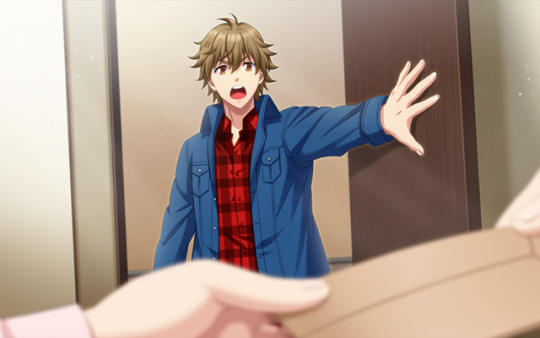
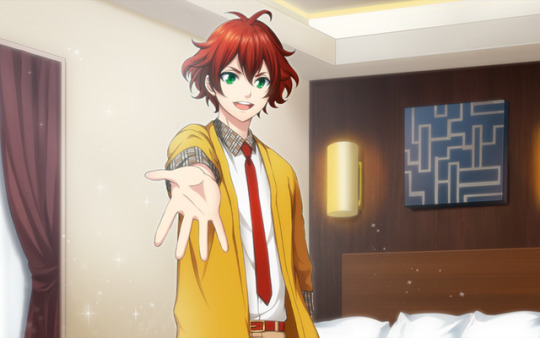

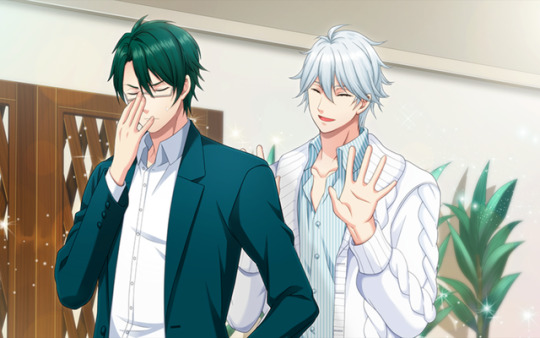



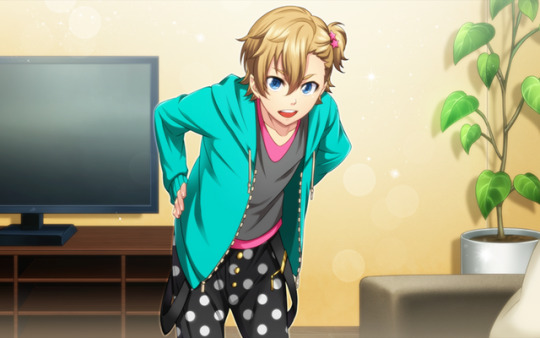

12.04.2017
Viidog Code Main Story - Episode 1 - 風变わりな探偵たち / The Detectives That Changed Like The Wind (Part 1)
Finally I decided to dedicate time to do some translation of this game - Viidog Code~! I’ve started playing this game from mid December last year, however unfortunately the game closed in February this year due to lack of funds. I really enjoyed the game since it’s pretty much the same as Ensemble Stars, and they too have a range of interesting characters and stories~ <3
I find it a shame that such wonderful characters and fun stories are being buried forever, seeing that I’m a fan of mystery and detectives actually, so I decided to share what I’ve managed to unlock and read over the short one month I have to save all the stories TWT TWT (I didn’t manage to read all the character stories I have, but did cleared all the main and event stories +W+)
So this is pretty much a side translation project that I decided to take up, with a schedule of one story per month (even though I wanted to start last month actually ^^;) So please read on if you’re interested in the world of “Viidog Code”~! +W+
Anyway as always, the summary of the story can be found below. Translation may not be 100% accurate due to my poor Japanese skills~
PS: Since this game asked the user to set a name for the heroine without a default name, I’ve shamelessly used my nickname “Momo” ^^; For the translation, I’ll use “me”, similar to how I translate Ensemble Stars stories~

Chapter 1: 本物の探偵 / The Real Detective
The story starts where a detective(?) talked to “me”, asking me to talk about the incident “I’ve” asked his help for. And thus “I” started talking about “my” past to him.
What “I” remembered from “my” past was heading out to the woods with “my” parents in an outing, and we’re heading home in the car. However, we met with an accident along the way where the brakes won’t work, and the next thing “I” know when “I” woke up, “I” was in the hospital with “my” grandfather looking worriedly over “me”. He was really grateful that “I’ve” woken up, saying that he had thought he might never see “me” again same as “my” parents. (”My” parents have passed away from the car accident unfortunately)
It seems like after the accident happened, someone has brought “me” to the hospital and had looked after “me” up till the point “my” grandfather came and took over. But “I” have no memory who was that and didn’t even know “I” was saved until “my” grandfather told “me” about it. And by the time “I’ve woken up, two months had already passed since the accident. (Seems like “I” was unconscious for a really~ long time…) Since then, “my” grandfather became the one who took care of “me” even though he knew that “I’ll” be lonely since “my” parents are now gone… (Why is it so sad already in the beginning?~ TWT TWT)
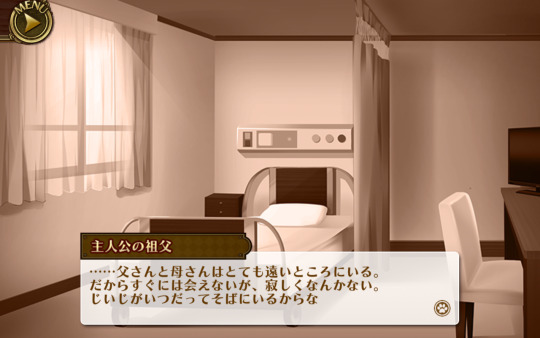
Now back to the present after “I’ve” finished talking about my past, what “I” need the detective to help “me” with, was to find the person / people who had helped save “my” life back then. And since he said he’s someone who only take payment first before starting work, “I” was just about to pass him “my” payment when…
A guy (Tsubasa) burst through the door, shouting at us to stop the transaction!
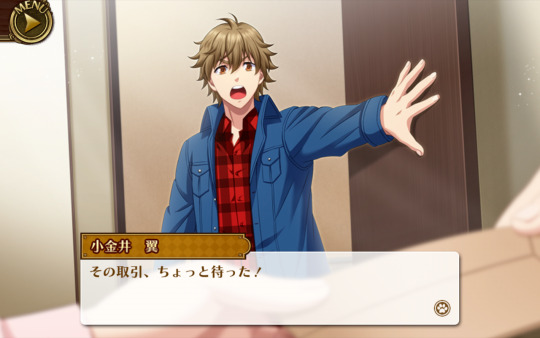
Quickly another guy (Kuki) entered the scene too, and the first guy asked “me” to quickly hide behind him, defending “myself” from the detective. The detective wasn’t happy that his business deal got interrupted and demanded what these “kids” are doing, ruining his plans.
Tsubasa took this chance to diss saying that even though Kuki looks young, he’s definitely not though ^^;

Anyway, they’ve stopped the transaction saying that it’s not valid, and asked the detective to come along with them, as they’ve been searching for him - a trickster who pretended to be a detective to cheat money out of people! (Which is actually pretty much true since the “detective” was just about to get “my” money at the moment)
The detective is obviously not pleased that these two guys were suspecting him and thus denied about it saying that he indeed in a detective. It was then demanded that it’ll be best to show his detective license to prove himself. The detective reluctantly took out his license, and Tsubasa peered and sniffed at it, saying that even though it looks just like a real one, it has a different scent to it. (Does Tsubasa have a really good sense of smell? O.O”) So he deduced that the license is probably made of a different material and not a true license.

It’s actually kind of sweet that Tsubasa was assuring “me” that it’ll be safe to be with them for now as they’re the “real” detectives, but that angered the fake detective instead saying that they don’t dress the part like one XDD
This made Tsubasa thinks that maybe they should have changed their outfits to be more like a detective, since it looks like the fake detective seems like a detective than them in appearance XDD (Tsubasa… Looks are not everything since in this case, I think it’s more suspicious wearing a trench coat style detective outfit outdoors actually ^^;)


The fake detective, being frustrated that this conversation is going nowhere and interrupting his plans, asked “me” to stop hiding behind them and go along with him. He even wanted “me” to hand the money over to him for “safe keeping” =w=“ Tsubasa quickly stopped him though, saying that they actually have evidence of him cheating people of their money. Since the fake detective self pro-claimed that it can’t be and that he have not left any evidence behind (it’s like indirectly admitting you’re a cheater already…), Kuki asked Tsubasa to show the culprit himself what’s the evidence that he had forgotten about.


Chapter 2: 運命の出会い / The Meeting of Fate
Thus Tsubasa began to take out the “evidence”, showing a photo of a pomeranian that was missing (The photo was given out by the owner to aid in searching it). Then he showed another photo of the pomeranian which the fake detective had found, which under close inspection they’ve realised that the two pomeranians aren’t the same and that means the fake detective had “found” the wrong pomeranian back for the owner.
And now the fake detective started to deny that he wasn’t the detective who took up this case of the missing pomeranian ^^;… But it’s no use denying since Kuki said that they’ve managed to trace the fake detective’s fingerprints on the collar of the pomeranian. The fake detective could of course try to prove that the fingerprints on the collar aren’t his by going with them for a fingerprint match, as Kuki asked Tsubasa to call for “Class 5″ to prepare the procedure for it.
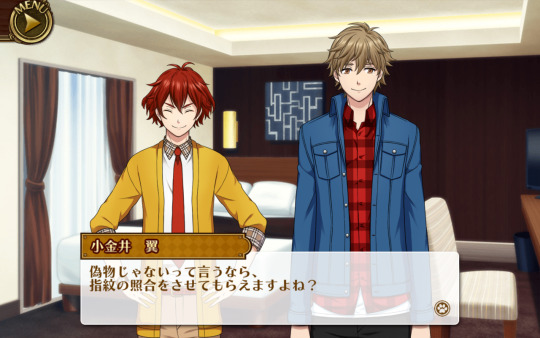
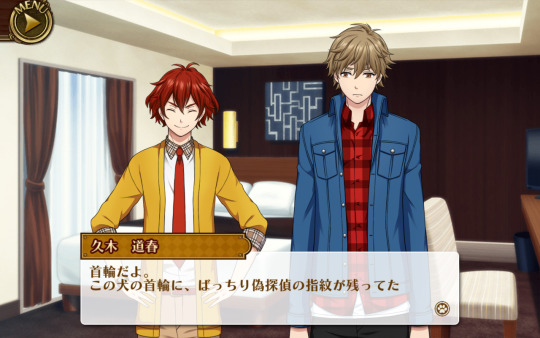
Seeing that the situation was not looking good for him, the fake detective decided to make a run for it. However Tsubasa was even faster than him as he quickly caught him and even sat / stepped on him to prevent him from running away ^^; (Funny that Kuki actually gave the “okay” for him to do that XD)
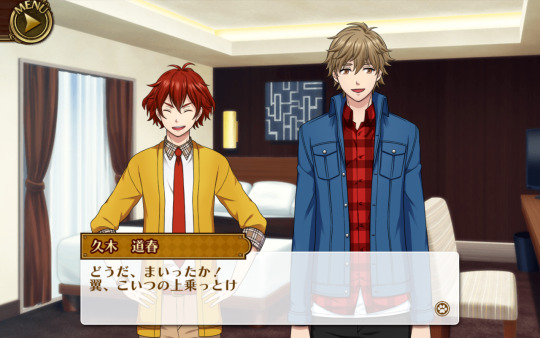
Just then, an unknown stranger actually brushed past “me” and made off with “my” packet of money! Tsubasa had noticed the stranger running away and even though he didn’t manage to catch a glimpse of his face, he might be able to catch up to him following his scent. Realising the stranger is probably an accomplice of the fake detective, Kuki decided to capture the fake detective first and let “others” catch up to the stranger, and thus let Tsubasa handcuff him to the table.
However, Tsubasa is someone who is really bad with handcuffs, that he almost twisted the poor guy’s elbow / hands. (Not that I should take pity on him… =w=“)


Now that everything seems to be settled, the two guys finally had a chance to do some self introductions! The short guy on the left with red hair is Kuki Michiharu, whereas the tall guy with brown hair on the right is Koganei Tsubasa. And different from the guy that they just captured, they’re the real detectives XD


“My” money is gone though TWT, but Kuki is willing to hear about “my” scenario on why “I” wanted to hire a detective, so “I” told them “my” story about wanting to find my savior back then.
Kuki can’t help to hide his shock when he realised that the packet of money consisted of all “my” life savings OAO” (So… now I’m totally peniless…!??) Seems that “I” really wanted to find “my” savior and meet him / her / them that “I’m” even willing to sacrifice all of “my” savings…


(Thanks Kuki, for letting me know that “I’m” indeed broke and peniless… TAT TAT)

They don’t hold onto the hope of “me” getting “my” money even after they catched the guy that took it just now (seeing how he might dropped it off somewhere or passed it to yet another accomplice), and knowing that “I” don’t really have anywhere to go or anyone to rely on now (apparently “my” grandfather had passed away too recently TWT), Kuki decided to lend a helping hand by asking “me” to go with them to their side. They had a workers’ hostel over at their detective agency and other than there’s no other females, there won’t be any problems at all~ (Is it me or when he said that, it’s like advertising they only have guys there… How can there be no problems when it’s just “me” as the only girl there though =3=“)
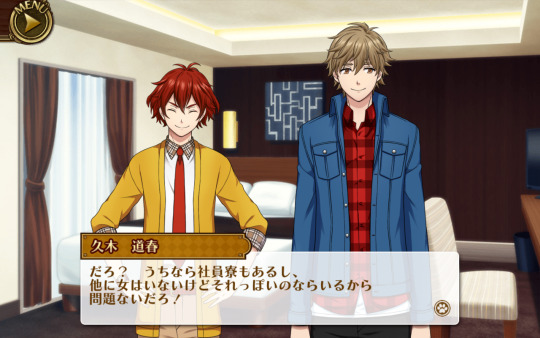
Tsubasa was also glad that “I’ll” be joining them, saying that “I’ll” definitely be able to get along with everyone there~ (Is that so…)First, “I’ll” be their assistant instead of a detective there, as “I” do not have a detective license.
(Yep, as much as Tsubasa said everyone is a “good” person there, Kuki definitely thinks that there’s a couple of troublemakers there ^^;)

Tsubasa probably called Kuki something that’s considered disrespectful to him, to which Kuki has to clarify that even though he looks young (having a baby face), he’s much more older than him… (Kuki, you don’t have to advertise that you’re THAT old actually ^^;)

And thus “I” followed them back to their detective agency for now, with Kuki saying that meeting “Class 7″ here can be consider a fate as well~


Chapter 3: 人とは異なる者たち / The Human and the Weird Beings
On the way to the detective agency, Kuki did a short introduction about it. The detective agency is “D.O.G. Detective Agency” but “I” have not heard about it at all and thus was very apologetic about it, however Kuki just said that’s because they aren’t as well known yet ^^; The detective agency currently houses 25 detectives and that “I’ll” get to know them when “I” meet them ^^ (since Tsubasa said even if they introduced everyone to “me” at once, “I” won’t be able to remember them all =w=“)
Now for the important part, all the staff in the detective agency are part of the “Kenrouzoku” (literally meaning dog-wolf pack…), including him and Tsubasa~ Kuki is more surprised that “I” don’t even seems to know about “Kenrouzoku” at all actually. More about “Kenrouzoku”, they look like human but they possess some special powers that’s from the wolves, for example running fast or having a very good sense of smell. And Tsubasa used his sense of smell just now to identify whether or not the license card is real or fake just now just by using this power.


It’s best to think of each of them having a species of dog as their spirit animal, which is said that “Kenrouzoku” had received gods’ power in a way. Each person had different species of dog which is according to their families. Kuki’s dog species is “Toy Poodle” (So cute and tiny, just like Kuki in a way XD), whereas Tsubasa’s golden retriever (very similar since he’s tall and hyped like one too~ ^^)
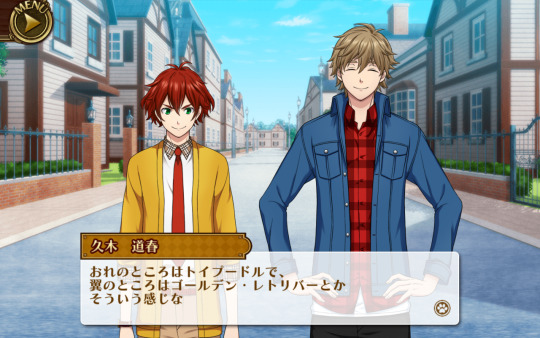
Apparently Kuki hates people calling him small / short, so when Tsubasa mentioned that he’s tiny like a toy poodle, he warned him that if he said anymore he won’t give him anymore snacks ^^;

Finally we’ve reached D.O.G Detective Agency after much chatting, and entering the office on the 2nd floor, Kuki called out to someone named “Shiro-chan”, announcing that they’re back…
And this is Kirishima Shiro, one of their comrades. It’s said that it’s usual that he looks fierce and asked “me” to don’t mind about it ^^;
Shiro also belongs to the same class as Kuki and Tsubasa, and was also on the case of the fake detective. However, he was tailing a different target today which is why he didn’t appear with them before.
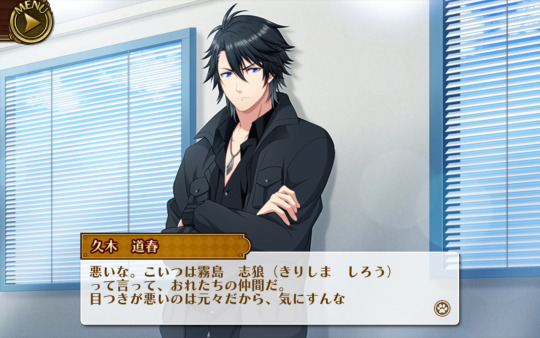
Shiro was curious about who “I” am, and thus Tsubasa proudly showed “me” off, announcing that “I’ll” be a part of them starting from today. Kuki added onto explaining my situation, saying that “I’ve” been cheated by the fake detective, and being penniless now, they brought “me” here…

Funny how Shiro just conveniently blamed “me” of him getting the wrong target today,… (Not my fault that the person he tailed wasn’t the culprit =3=“) And he doesn’t like how “I” started calling him “Shiro-chan” like the others, saying it’s embarrassing… ^^;
“I” got nervous / scared that “my” face twitched to making a scared face but no idea why Shiro thought “I” was smiling instead… =w=“ The other guys quickly helped defended “me” from him, saying that Shiro was the one trying to pick up a fight here.


Chapter 4: ようこそ, 探偵事務所へ / Welcome to the Detective Agency
In the end, Shiro left in a huff, saying that he’ll not approve of “me”, just because “I’m” a human and not a “Kenrouzoku” =w=“ Kuki dissed at him, saying that “I’m” not needed to be approved by him actually ^^; (since ultimately it’s Kuki who said “I” can stay here)

A new guy appeared along with another guy with white hair (Shu + Senri) asking what exactly had happened in here, and upon seeing “me”, he thought “I’m” a client who has a new case for them. Kuki quickly clarified that “I” was being picked up by him (sounds like “I’m” an abandoned puppy ^^;), and Shu literally almost face-palm hearing about this, and said that this is not like picking up a puppy or kitten…(Shu thinks the same like me~)

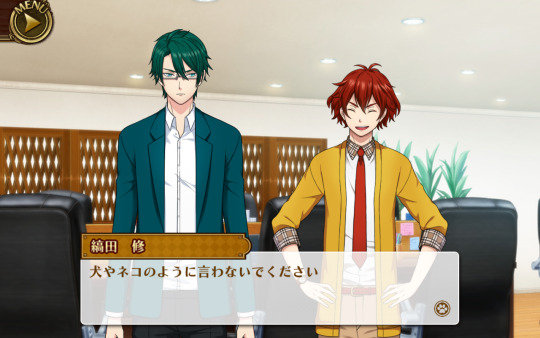
Kuki said he’ll be responsible of “me” though, and so requested that “I’ll” be placed under “Class 7″. Shu noticed that “I’m” a human, and though there’s no rule that humans aren’t allowed to work at D.O.G agency, the agency is now currently under the lead of Shu so he did have the power to decided whether “I” can stay here… or not… OAO” Kuki helped “me” to plead for Shu’s approval for “me” to stay here, saying that “I” already have no where to go back to and it’ll be heartless to abandon “me”.
Thank goodness, Senri (the white hair guy) stepped in to speak up (for “me”… I hope), saying that it’ll be good to train “me” to be the assistant for all the detectives, and he knew that Shu will be worried later on about “me” if he did kick “me” out of the place. So for now “I’ll” be placed under the care of Kuki, while Shu and Senri will supervise and see how things will go on from here ^^

They then started to talk about how Kuki and his team used to break a wall while working on a case, and that made the client angry as Tsubasa and Shiro had to spend a day to fix up the wall in the end~ Shu was hearing about this for the first time but ultimately decided to let Kuki off with a warning, that if he cause a big trouble like that again, he might just fire him without any chance of forgiveness OWO”

And so they called for one of the assistant around here - Leo to guide me ^^ Also Shu and Senri gave their introductions officially, their names are Shimada Shu and Yashiro Senri.


Next, they taught “me” on how the agency is splits into multiple teams, which they call “Class” actually. The class that “I’m” in is Class 7, where Kuki himself is the class leader, and Shiro and Tsubasa are the members. Shu and Senri are in Class 1, with one more additional member called Rui (But he isn’t here now). In total there are 7 classes, but “I” haven’t had the chance to meet Class 2 - Class 6 yet since the members aren’t here.


Chapter 5: 事務所を統べる者 / The Rulers of the Detective Agency
(It’s cute that after listening to “my” story, Leo felt sad that “I’m” all lonely by myself now… But it’s okay Leo, I have you and the rest of the detective agency with me wahahaha~ XDD)

Apparently “I’m” also allowed to stay at the workers’ hostel, as long as “I” work hard to earn my living expenses. Suddenly the guy that they were talking about who wasn’t here finally came into the room (Rui), and upon seeing me, he’s shocked to know that there’s a new member joining them today. (And what’s up with everyone having a problem with “me” as a human =w=“… It sounds kind of racist =w=“…)
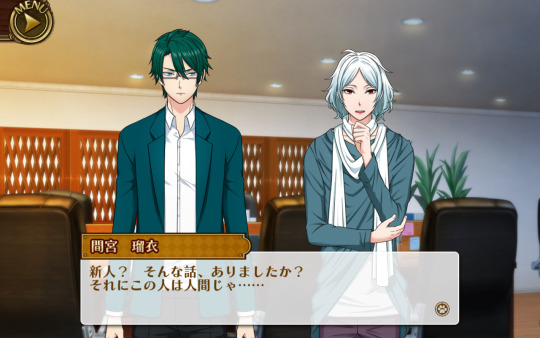
Rui had finished his work early for the day, but decided to go strolling around the neighborhood and went to the bookstore to pick up some books. Looking at “me” again, Rui smiled and made his introduction - he’s Mamiya Rui.

Kuki had planned to bring “me” around to the hostel since night is ascending, however Shiro, Tsubasa and him all have reports to work on first before they could go. (Shu and Senri had went off to work on something else in the meantime) In the end, it was handed to Rui to help to bring “me “for a tour around the hostel instead…
(It’s funny how Tsubasa realised that Shiro is using the wrong paper to write the reports instead, and Kuki was like… “Shiro, I know you’re used to writing reflections … =w=” Shiro had written reflections way too many times that he just used that paper due to how used he is to it ^^:)


As Rui led “me” to the hostel, he talked about it, saying that the hostel is actually within the same building as the agency, with it occupying half of first and second storey, as well as the entire third to fifth floors. (Literally more than half of the buildings are for the hostel… O.O”)
However, the mood and Rui’s face changed completely when we reached the hostel’s living room, as he started to confront “me” and wants “me” to come clean with everything regarding the cheater (a.k.a fake detective).
“I” said that “I” do not know anything much about the cheater actually, but Rui did not believe that, and insisted that “I” must be from some unknown informant… (What did “I” do to let you suspect “me” like this?… =w=“)



Chapter 6: 新しい出会い / New Encounters
“I” couldn’t answer Rui’s questions initially, and thus stayed silent. However Rui doesn’t like it either and hoped that “I” wasn’t buying time thinking up of excuses… (since he won’t believe in them). And so “I” told him the truth that “I” get to know about the fake detective because “I” came across a flyer, but Rui isn’t buying that reason either… (so what exactly do you want me to say sir?!) In the end Rui just wanted “me” to confess that “I’m” the fake detective’s accomplice.


At this moment, a bunch of new guys came rushing into the living room, excited to meet “me”. Rui, seeing that his plan to confront “me” has been interrupted, “conveniently” dumped “me” under the care of them, saying that he suddenly has things he had to see to… (This guy is really… D:)
(Yep, as if “I” wanted to talk to you again alone the next time, Rui… Ugh D:)

One of the boys is really very shy (so cute~~ >///<) and thus hid behind the big and tall guy. The tall guy wanted to greet “me” by stepping forward, but almost tripped and landed on “me”, but thank goodness he managed to get his footing back ^^; (If not I’ll be squashed…)

And so they started off introducing themselves to “me”. The big tall guy is Takayama Hijiri, who upon seeing “me” commented that “I” was smaller than he thought =w=“ (I think anyone would look tiny compared to Hijiri though…). He even bent down to look at “me” at eye level, and ended up being scolded by the guy next to him (Yanagi) that he shouldn’t treat “me” as if “I’m” a child.
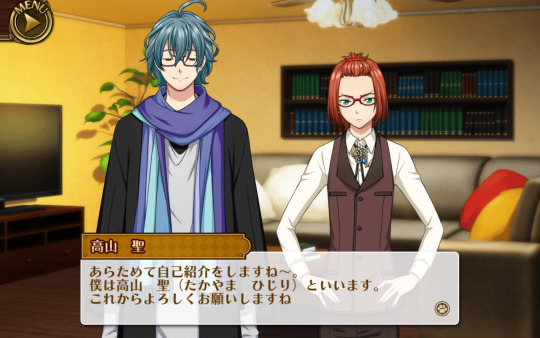

Next will the guy next to him in red spectacles and hair clip. His name is Hosho Yanagi. You might thought he seems fitting for the class leader’s role but unexpectedly the class leader for them (Class 2) is Hijiri instead XDD

A hyper and active boy next popped up to give his introduction, he’s Uzuki Ryohei.

And finally it’s left with the tiny shy boy to give his introduction. Hijiri initially wanted to help him but got stopped by Yanagi, saying that this was a good chance for the boy to get over his shyness, and said that “I” won’t eat him so don’t be afraid ^^;
In the end, the boy gathered his courage and introduced himself as Azuhata Yu.
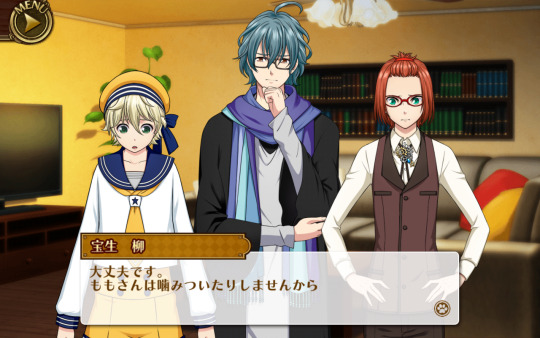
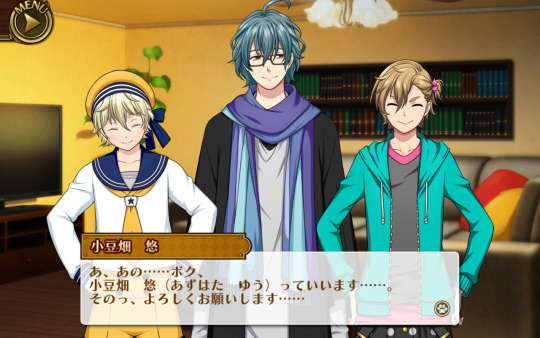
Hijiri was glad that Yu had made a step forward, and patted his head. He also patted Yanagi’s head, but that made him embarrassed instead ^///^



Since there’s alot of CGs for the first main story, I’ve decided to split into 2 parts. And the first part is already packed with characters! (We have like 10 new characters to remember?!)
Personally I’m already quite fond of Class 7, since they’re primarily the class I’ve chosen when I started the game (I wish Shiro will get warmer with me over time though~), but Class 2 is pretty fun even though we’ve not met all the characters in that class. For me, I’m not too fond of Class 1 that much, but probably alot has to do with me not liking Rui. Why do I feel like that guy is targeting me for no reason…
More characters will be introduced in Part 2, which hopefully will get translated by me soon =)
3 notes
·
View notes
Text
the consumption and production of the teenage girl as result of accessibility
Since the 1940′s, pop culture has played an important role in teen girls’ lives. Through venues they were given, they were able to self express and find some control in their lives. The key term is “were given”, as the accessibility of mediums is a form of control. If girls might only be given spaces in which to create, these spaces impact the ways by which girls might express themselves, or, more simply what they might create and say.
Following are forms girls have been presented with by which to view themselves and their world, including pretending with dolls, fan culture of boy bands, and girls presented in cinema... These mediums are more complex than presented, but at their cores, these mediums did not allow girls to express their own experiences, emotions, and stances.
Finally, with the invention of photocopiers, zines enabled girls to have more complete freedom of their narrative.
Pretending with what is given
At an early age, girls are producers. The earliest form of production might be the imagination, allowing girls to produce the content they wish to dwell on. This often includes toys. However, their agency does not necessarily allow them to always choose exactly what they play with. At most, they may be able to select toys to buy, but they are still often left a selection that adults design and present. In turn, these items in some way form how they view reality, as they play it out before them.
While there have been many wonderful toys, one of the most iconic designs include the alluring Barbie. Barbie has been the brunt of many critics over the years, but this hasn’t seemed to stop the companies producing these types of dolls. Despite the agency and empowerment that Barbie advocates through her career options (which, early on, was still limited to the feminine workforce), the appearance is completely misleading to young girls. This infograph from The Daily Mail tells us how:

In short, Barbie wouldn’t survive very long, yet she is, and continues to be not only the imagined result of “perfect puberty” by Catherine Driscoll , as mentioned by representative of the female ideal (230).
There is a sense of male gaze, even in the doll for children. She has a massive chest, but she’s dainty, her eyes wide and childlike. The first Barbie of the 1950′s was clearly foxy, with her heavy eyeliner and sideways gaze.

Fandom Culture
Fandom culture is an intriguing concept, allowing girls to in a way take control of a concept that is presented to them, at the benefit of the producer.
One of the most iconic example is of the Beatles mania that swept the world of teen girls. Ehrenreich wrote on the topic:

(525). Later in the article, she writes that adults viewed it as a sort of epidemic to which teen white girls were susceptible.
Girls were presented with this boy band, and in a way, they made it their own form of rebellion and independence. They were willing to defy authority, fighting policemen in order to get closer to the boys. As the Science Newsletter of February 29, 1964 noted, Beatlemania was a “release of sexual energy.” They were attracted to the unconventional sexual attraction that the Beatles presented; that is, the more androgynous look and attitude (Cura). They defied masculine expectations of dress, and they were willing to cover girl bands. Finally, they addressed their fans even in their songwriting, careful to use personal pronouns like “me” and “you” (Cura, 109).
Girls made The Beatles an iconic band. Without them, The Beatles would have become just another band, but within the confines of the materials presented to them, girls created something incredible.
Media as a Spokesperson
The media we consume often informs the way we see the world and each other. This is especially true referring to media for girls, as this media is often directly related to trends, behaviors, and ideas.
Entertainment, specifically television and movies, is painted to reflect the world, to be relatable, to be easy to understand. While this is true, it begs a sort of chicken and the egg question- does the media reflect culture or does culture form to fit the media?
A common theme we see in media to this day is that concept of good girl, bad girl. The good girl is virtuous and comes out on top, while the bad girl is popular, emotional, angry, and in the end, a loser. This trope clearly cements the values a society has, but also reminds us of the paradox theme that the underdog will, at some point, be the top dog… which is who lost out in the first place. In reality, there is no way to win in society, and this pressure comes in part from media. Examples include more recent films such as Mean Girls.
Another common theme is the male gaze, as the vast majority of films and television shows are created by masculine eyes and minds. As the saying goes, as some sort of justification, well? Sex sells. Examples of this are everywhere, from Lolita to horror films.
Lolita is an incredible example. Based on the book published in 1958, the film romanticizes the sexual assaults of Lolita and prompts an entire Lolita style, enthralling young women and men alike with emotional labor and sexual appeal. This is a common occurrence in visual media. Ira Wells wrote in her article "Forgetting Lolita: How Nabokov's Victim Became an American Fantasy”:
Kubrick airbrushes this character into a 1950s pin-up model. In her introductory shot, Lolita is (un)dressed in a bikini, propped up on one arm, the posture and lighting carefully coordinated to accentuate the womanly swell of her hips, the smooth perfection of her long legs, her sultry expression as she looks up to meet our gaze. Of course, Nabokov’s Humbert is attracted to Lolita because of her childishness, not because she is a precocious bombshell. But the real issue is one of distance. The novel never lets us forget that there is something monstrous about Humbert’s desire for Lolita. Kubrick’s lens assumes that you are the monster—which would be fine, had he not also aged Lolita and endowed her with womanly allure, creating a safe imaginative space for our erotic consumption of her snowy young flesh.
Films have this wonderful way of embracing sections of feminism in order to twist them into something more self serving- and very confusing to teenage girls. The encouragement of the feminist movement for a girl to embrace her sexuality was wonderful news for filmmakers who had always desired (less empowering) female sexuality from the beginning. This creates quite a confusing dialogue for girls. On one hand, the male gaze sexualizes women and girls, calling attention to their physical attributes in a demeaning way. On the other, feminism asks girls to embrace their bodies, to sleep the way they desire, and to demand respect. Feminism’s view of sexuality is more based on equality and freedom, but as the media embraces female sex, pushing hypocritical patriarchal expectations, it can be more than a little confusing for girls to navigate.
This is why film by women is so important. The female experience will not be accurately represented until women have more access to materials and funds that allow them to create, to share their sides of the stories.
4 notes
·
View notes